Features
Over the Edge and back again: One woman’s journey through loss, grief, and healing through community
This intimate interview shares one woman’s journey through grief and healing after losing her wife, and how participating in Over The Edge became a tribute, symbol of resilience, and celebration of chosen family

Grief has a way of changing our lives in a flash. It has the power to isolate us, undo our sense of identity, and leave us swimming in a sea of questions that have no simple answers. But it can also bring unexpected community, strength, and even moments of joy. In this conversation, one resilient woman shares how the loss of her wife became the beginning of a new kind of connection – one that involves a bereavement group, a giraffe costume, and rappelling off the side of a building to raise awareness while fundraising for a good cause. Through humor, community, and vulnerability, Denise McCanles found a way to honor her late wife Michelle’s memory while helping others navigate their own journeys of grief.
Can you tell us a little bit about what inspired you to participate in Over the Edge and how you honor your late wife’s memory through this experience?
After my wife passed away, I started attending a bereavement group through the Cancer Support Community. It ended up helping me more than I could’ve imagined, especially since, around the same time, my mom was dying and my siblings went kind of… off the rails. Their political views shifted, they moved to Tennessee, and I talked to them less and less over time. It was a very lonely time.
That bereavement group became my family.
So when I saw the Over the Edge fundraiser, I wanted to give back. These people were, are, incredible. I decided to rappel for the fundraiser and wear a giraffe costume in honor of my wife, Michelle. She had a business called Small Giraffe Production, and she was a director, producer, and big fan of giraffes. She actually owned a giraffe costume, so I wore it as a tribute to her.
That’s beautiful. This giraffe onesie… is there more to that story?
Yes! I have to share this, because it really shows how special that group is. We had joked about the giraffe ears as part of the costume, and when they came to pick me up for the event, every single one of them was wearing giraffe ears. I just burst into tears. It was such a beautiful, supportive moment.
What made you decide to take on the challenge of rappelling in the first place? Was it a tough decision?
No, not really. I’ve always liked a challenge. I tend to do things that scare me, and this definitely qualified. Plus, I thought it would be fun. Especially in the costume. And honestly, no one else volunteered! But I really wanted to do it.
Would you say Over the Edge is a bit of a metaphor for you? What do you hope people see or feel when they witness you doing it?
Oh, definitely. Michelle battled cancer for 13 years. It was a rollercoaster. Over the Edge is a good metaphor for that whole experience. Sometimes you feel like you’re over the edge of your sanity, because it’s just so hard. But also, after seeing someone you love die in front of you, you start to feel like you can do anything. There’s a strange kind of strength that comes from that.
And I have to say, the Cancer Support Community is amazing. I’ve been in a lot of support groups – caregiver groups, grief groups, therapy – and nothing compares to this one. Our facilitator is phenomenal. We’ve even kind of become the unofficial “poster group” for Over the Edge. They always use our giraffe-ear photo on the fundraising page.
What impact has your bereavement group had on your grieving process?
Huge. Life-changing, really. I tried three different grief groups before this one, including one at another cancer center and one at the LGBTQ Senior Community Center. None of them really clicked. But when I joined this group, I felt like I was home.
Everyone is kind, generous, and respectful of each other’s time. In other groups, sometimes people monopolize the conversation, but this one is so balanced and supportive. Just the other day, I asked if anyone else talks to themselves, because I’ve been doing it more and more, and started wondering if I’m losing it. And they all said, “Of course we do!” It’s that kind of connection, being with people who get it, that makes such a difference.
Does that inner dialogue you have with yourself act as a coping strategy for your grief?
Yes, definitely. I also talk to Michelle. And I know not everyone believes in this, but I’ve gotten so many signs from her, things I can’t explain. I’ll ask for a sign, and suddenly a light starts blinking. I just know it’s her. I’ve even seen a medium who told me things she never could’ve known. We were together for 33 years. That kind of connection doesn’t just disappear.
What advice would you give to couples hoping for that kind of longevity?
Patience. And therapy. I have five siblings, and among three of them there have been 11 marriages and 13 divorces. Michelle and I were together longer than all of them, and for most of that time, we couldn’t even get legally married.
Relationships take work. We went to couples therapy many times, especially in the early years. I think a lot of people give up too quickly, or they expect it to always be easy. It’s not. But it’s worth it. I found my soulmate. And even though I lost her, I still feel incredibly lucky, because a lot of people never find that.
Grief can be a very personal, private process. What has it been like for you to share your story so openly?
I just want to help people. I used to do stand-up comedy, I love making people laugh. But I also love helping people. Everyone grieves differently, but if I can offer anything, it’s to be patient with yourself. People try to give you advice or tell you what you “should” be doing, and honestly, there’s no right way to grieve.
Some days I didn’t want to do anything. Michelle and I used to love going to movies, and I still haven’t really gone back to the theater. I’ve had to figure out new things that bring me joy. It takes time. And the people who haven’t gone through this kind of loss? They often have no idea what you’re feeling. That’s why finding a group is so important.
You mentioned that you were a stand-up. What role has humor played in your grief process?
Oh, it’s huge. Humor has always helped me cope. I bring a lot of laughter to the group, and there’s a lot of humor there, believe it or not.
I’ve also started doing something called the Thera-Trumpy Booth. It’s my little Lucy-from-Peanuts therapy booth, but for Trump-induced anxiety! I take it out to protests and parks. People come by, we laugh, we talk politics, and they hit a Trump doll on a stool to release some tension. It gets me out of the house, talking to strangers, connecting. And sometimes, it even brings up grief. People share their stories, and we find common ground. It’s unexpectedly therapeutic.
Where did the idea for the Thera-Trumpy Booth come from?
Back in 2016, I had the idea. I remembered Lucy’s booth and thought, What if I did a version for people anxious about Trump? So I built it and started bringing it around. I actually kept it in my garage all through the Trump presidency, just in case. Turns out I was right to hang on to it! It’s funny, I’ve always been a kind of performance artist. This feels like the perfect blend of activism and comedy.
Have you ever had an interaction with a Trump supporter at the booth?
Oh yeah. Some just shout “Trump!” as they walk by. One guy asked if I’d shot Trump. I was like, “If I had, I wouldn’t have missed!”
But one moment really stood out. I was surrounded by women talking about politics and life, and this man just stood there listening. I could tell he was a Trump supporter, but he didn’t interrupt. And eventually, we had a civil conversation. He was Canadian, strangely enough. But it reminded me that sometimes – not always, but sometimes – people are willing to listen.
Let’s talk about identity. After 33 years with your partner, what was it like to rediscover who you are on your own?
That’s one of the hardest parts. Who am I without Michelle? We were a team, a duo. I lost my best friend, my sounding board, my partner in everything.
Even with my family, I felt disconnected. My mom was the one person in that group who made me feel like I belonged. After she passed, and then Michelle, I felt like I had no place left in the world. I’m still figuring it out. Even today, I find myself asking, What am I doing?
But I do know I want to make a difference. That part hasn’t changed.
What advice would you give to someone who’s newly grieving and wondering if they’ll ever feel strong enough to do something like what you do?
You can, it just takes time. Honestly, I stayed home for a long while. And I’m a very outgoing person, so that was hard. But grief takes over. For me, maintaining my mental health has been about movement. I swim every day and ride my bike. Exercise has always been important in my life, but after loss, it became essential. Even if it’s just getting outside for a walk, fresh air helps. They say nature helps with depression, and I believe it.
Depression and anxiety have been constant companions for the past two and a half years. I’m still dealing with it.
My advice is: don’t judge yourself. If all you can do today is stay home and watch Netflix, then that’s okay. If you need to cry, cry. If you just need to sit in silence, do that. You have to feel the grief. If you try to stuff it down, it will find its way out, and not always in healthy ways. So let yourself feel, without shame or guilt. That’s the most important thing I can say: don’t judge your own process.
And I promise, little by little, you will start to feel better. Six months ago, I probably wouldn’t have said that. But healing happens slowly, unevenly. And eventually you start to feel moments of light again. When you’re ready, try to find community. At first you might feel like being a hermit. I sure did. But try not to stay in that space forever. Find people who’ve gone through something similar. That connection can make all the difference.
“OVER THE EDGE”
Saturday, October 4th
9am – 4pm
Andaz West Hollywood, 8401 Sunset Blvd
SIGN UP TO RAPPEL — Fundraise individually or as teams! OR;
GET TICKETS — Cheer on rappelers at the Landing Party, $25 (Kids are FREE!)
Refreshments and light bites
Family-friendly music— DJs HXRØ and MoonGoon
Glitter tattoos
Cash bar
Aura Portrait Sessions
Sign-Making & Cheer Station
…and more!
Visit www.cancersupportla.org
Features
LGBTQ+ legal hero Jon Davidson hands civil rights torch to new generation
Davidson shares successful AIDS, GSA, and Asylum cases. As well as being in a polyamorous relationship.
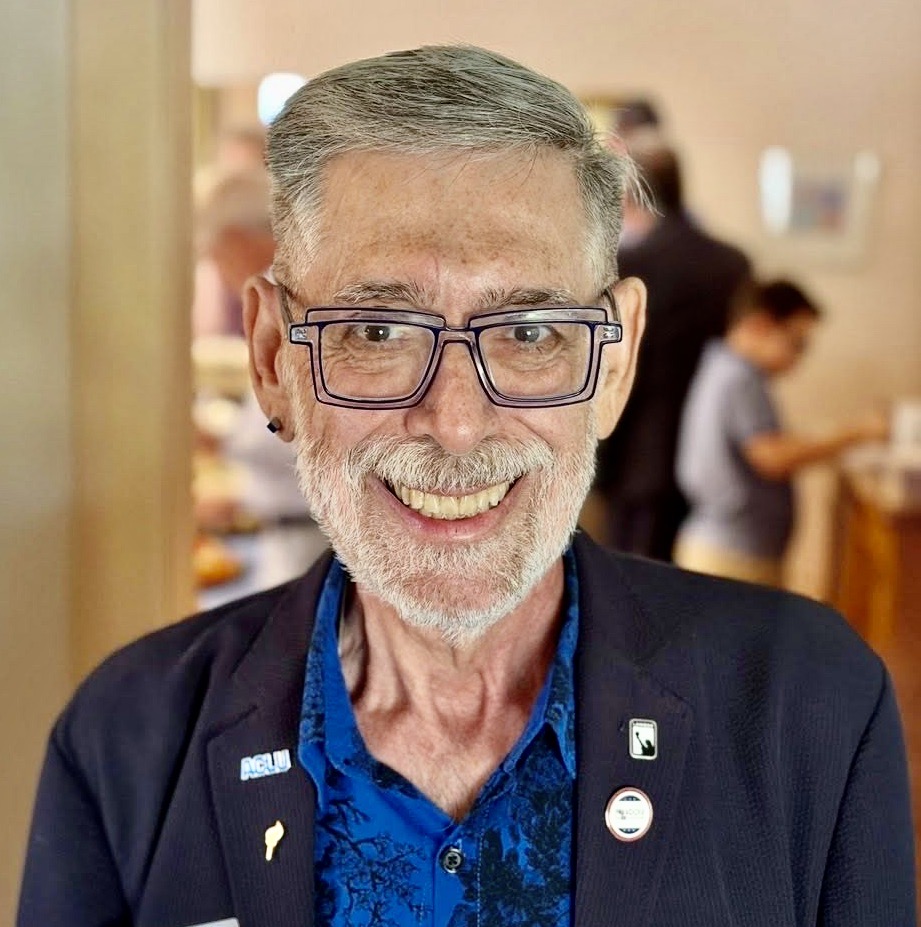
There are heroes among us in this violent struggle against the demented but planned tyranny of Donald Trump. In cities large and small and rural regions across America, including Los Angeles, “We the People” are standing up, walking out, marching, holding signs, and blowing whistles to bravely fight for our neighbors, our freedom, the US Constitution, and plain old fairness and human decency.
But for some of us, that fight has been existential for decades – as illustrated through the LGBTQ+ and other Smithsonian Institution historical exhibits Trump wants to hide and erase to make America way more White Supremacist again. (Please see this video to better understand our history and Trump’s promise to “decisively win the culture wars.”)
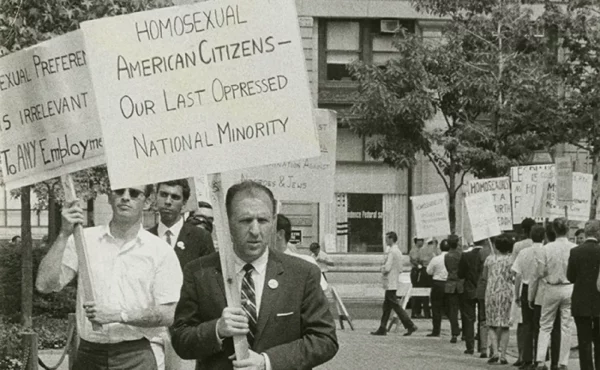
That’s why it feels like such a loss when a hero leaves or steps back, even for the most logical and human reasons.
Gay attorney Jon Davidson has been such a hero, a leader among the brightest of our warriors, using his humanity, skills, and acumen to fight against inculcated oppression and achieve real progress toward first-class citizenship.
“It’s impossible to describe how much our movement owes Jon Davidson,” Lambda Legal Executive Director Kevin Cathcart said in 2010 after Jon received the prestigious Dan Bradley Award, the National LGBT Bar Association’s highest honor.
Recently, Jon announced that he is retiring, which – given our tumultuous republic – seems like awful timing. “I’m 70 years old. I’ve been doing LGBTQ civil rights work for 40 years,” he shared during a comfortable Zoom interview on Jan. 28.
“I was a partner in a big Los Angeles law firm [Irell & Manella]; left to go to the ACLU of Southern California; then went to Lambda Legal, where I was for 22 years; then went to Freedom for All Americans, where I was doing lobbying trying to get the Equality Act passed; and then the national ACLU, where I’ve been for the last 4 years,” he says, pausing briefly.
“I really have started to feel like it’s time to let others lead – to get other voices out there and other ideas, especially from younger people, from trans and non-binary people, from people of color. And sometimes that means stepping aside,” Jon continues. “The thing that makes me feel okay about it is I’ve worked with a lot of those people, and I have tremendous confidence that they can do the best job that possibly can be done….None of us is irreplaceable.”
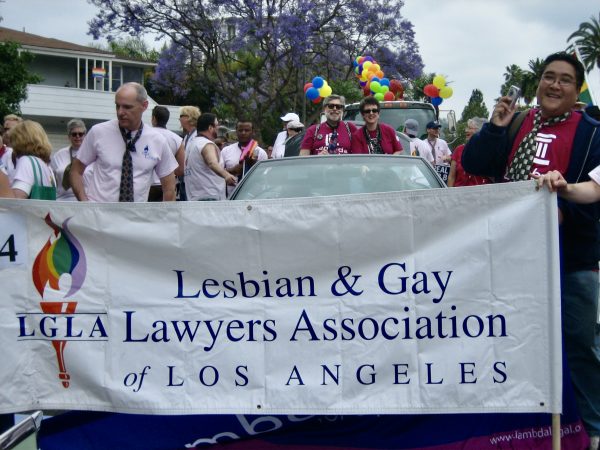
And, Jon adds, “even though I’m stepping down from paid positions, and I’m planning to take some time to take a rest and do the things that I never had time to do.… I doubt I’m really stepping away in the long term and that I will find other ways to contribute without being a full-time working civil rights lawyer.”
He’s keenly aware that resistance is needed.
“It’s a very scary time right now, no question. It’s probably the most frightening period of my long life,” Jon says. “Trump is an ego-driven, unbalanced, narcissist, erratic, mean-spirited, fungus, thin-skinned, vindictive, arrogant, corrupt….It’s hard to come up with enough adjectives. But mostly cruel, racist, sexist, transphobic wanna-be dictator….I guess the solace I take from the current period is the extent to which people are protesting.”
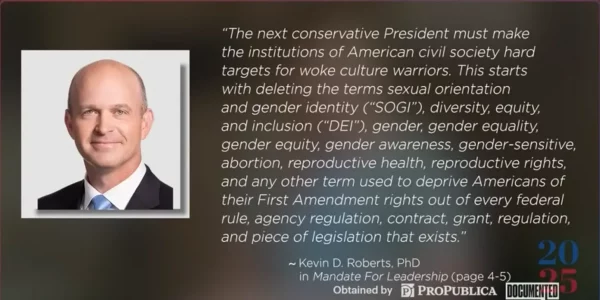
It’s not just the legal victories or the cases in which he was co-counsel or a thoughtful coach who will be missed. It’s the example Jon sets as a gay man. He emanates a deep secular/spiritual commitment to justice. He listens to everyone, regardless of class or position, embodying the old saying, “listening is an act of love.” And then he tries to find a way to help.
Jon didn’t just leave Irell & Manella, where he worked in the media and entertainment division after graduating from Stanford University, Yale Law School, and working as an attorney for eight years. He and his best friend, Sharon Hartmann, had convinced the partners to let them represent homeless people pro bono – a new and expensive concept at the time. At Jon’s retirement party, Hartmann said Jon built a team, and three years later, in 1987, they won an award for their pro bono work, and Jon, 29, made partner, which she called a “pretty good beginning.”
In fact, according to an April 7, 1987, LA Times feature entitled: “Repaying Society: Pro Bono: Renaissance in Legal Aid,” Jon “marshalled 34 lawyers, 46 secretaries and paralegals at Century City’s Irell & Manella to join poverty law firms in aiding the homeless on Los Angeles’ Skid Row.”
“Lawyers in private practice get to have a generally fortunate life. They are highly compensated, have a high status, and get a fair amount of deference and respect. Because of all those things, you really owe something,” Jon told The Times. “Part of it is, ‘Gee, this is something I really should be doing.’ But another thing is, I find it very satisfying to think there are certain people I can help.”
Jon left his Big Law Firm’s half-a-million-dollars-a-year salary to become Lesbian and Gay Rights Project Director at ACLU/SoCal under the extraordinary Ramona Ripston for $50,000. Coming out as a “gay rights activist” during Ronald Reagan’s second presidential term and the horrors of the Second Wave of AIDS was a big deal. So was his motivation.
“What initially got me into doing this work was the AIDS epidemic,” Jon tells me during our Zoom conversation. “I had quite a number of people I was close with who were very sick and who were dying. I felt like I was going to funerals every week. And so, even though I was in private law practice, I started doing pro bono work, which means ‘for the good of it’ – but it means ‘not paid,’ also.”
Jon says one of his most important cases was Chalk vs the Orange County Board of Education, a case that got national attention with a slew of other important gay and lesbian attorneys and a slew of amicus briefs, including one from California Attorney General John Van de Kamp.
Vincent Chalk was a beloved certified teacher and Regional Occupational Program coordinator for deaf students at University High and Venado Middle School. In February of 1987, after informing his supervisors that he had AIDS, Chalk was reassigned to an administrative position and barred from teaching. His claim of discrimination and request for an injunction were denied in the district court. Jon worked on his appeal, which they won. The Nov. 24, 1987, LA Times headline read: “AIDS Teacher Returns Amid Hugs, Smiles.”
“It was incredibly important to him to keep working because he found it very satisfying,” Jon says. “We won at the Ninth Circuit Court of Appeals, which governs California and other Western states, which established that people living with HIV are protected against discrimination….That started to turn [around] some of what had been people being turned away at restaurants and stores and not getting the medical care they needed. That felt very significant.”
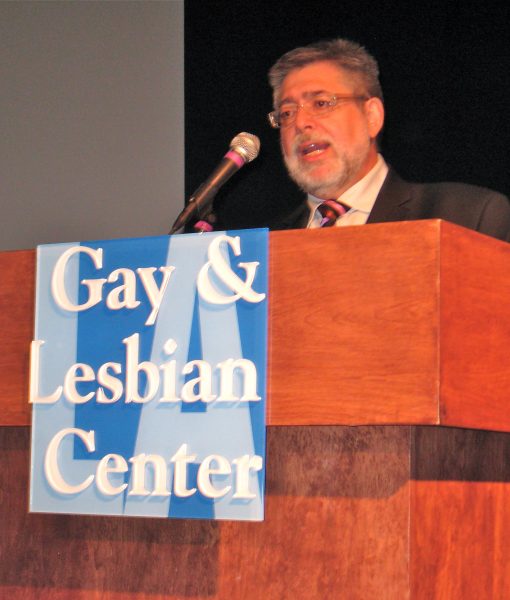
Another “really important” issue was helping make Gay Straight Alliances possible.
“I did several cases, one in Salt Lake City and one in Orange County, in which we got it established that federal law requires schools to allow those clubs to meet if they allow other non-curricular clubs to meet on campus. That really seemed to me important in terms of making it possible for young people to feel like it was okay to be out, to establish connections with other LGBTQ people, and to start to do things to change attitudes at the high school level,” Jon says.
“And there are a number of those clubs right now that meet at the junior high school level. My partner was helping run such a program when he was earning his master’s in social work at a middle school for low-income, principally Latino students,” Jon continues. “So that seemed really important in turning things around.”
But, says Jon, the case that “touched me the most emotionally” was where I represented a man from Mexico who fled to the United States after he was threatened with his life by Mexican police, who assaulted him, stole his clothes, and left him in the middle of the desert. He came to the United States, sought asylum, and was initially denied asylum by an immigration judge who said, ‘Well, you don’t look gay to me. And so, you can go back to Mexico and just don’t make an issue of it, and you should be fine.’”
Jon appealed, and the case was sent back to the same judge, who changed his mind, “in part through the argument that, wait a minute – people who are persecuted in other countries for their religion or their politics are not told, ‘Oh, just don’t make an issue of it. Don’t let other people know.’ Those are grounds for asylum, not for denial of asylum.”
They got a new trial, and the judge granted asylum from the bench. “I walked out with my client, and he started crying and saying, ‘Wait. Does this mean that I get to stay? That I’m not going to be sent back?’ And it was just feeling so directly like you had really turned somebody’s life around. It felt an honor to be able to do that for someone.”
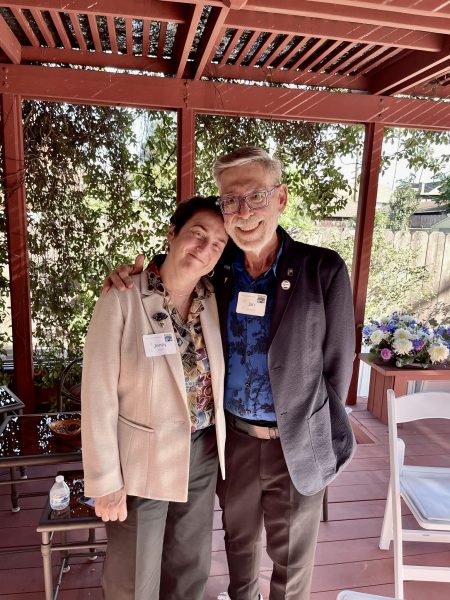
In 2017, Jon unexpectedly left his job as Legal Director at Lambda Legal, working closely with “work wife” Jenny Pizer. He went to Freedom for All Americans as their Chief Counsel, and later, he returned to the ACLU as Senior Counsel at the National ACLU LGBTQ & HIV Project.
Camilla Taylor, Deputy Legal Director for Litigation at Lambda Legal when Jon left, wrote an extraordinary tribute, with stories about and links to some of his hundreds of cases.
“If I had a nickel for every time I’ve witnessed JD up at ungodly hours to work, sifting through legal materials and strategizing with his colleagues about how to conquer a problem or action against our community, mastering every minute detail, we could shut down Lambda Legal, colonize Mars, and turn it into the queer utopia of everyone’s dreams.” Taylor wrote.
And that queer utopia includes individuals having the real freedom to determine how they wish to live their lives. Asked why Jon – who helped win marriage equality – has eschewed marriage for himself and his longtime domestic partner, psychotherapist Syd Peterson, Jon says simply: “We won the freedom to marry, not the obligation to marry. And for Syd and me, it was not the way we conceived of our relationship. We always had an open relationship, and certainly some people who are married have. But in more recent years, we’ve had an openly polyamorous relationship.”
But, since he co-drafted with Jenny Pitzer the California Comprehensive Domestic Partnership Law, “I felt some loyalty to it. So that was important to me.”
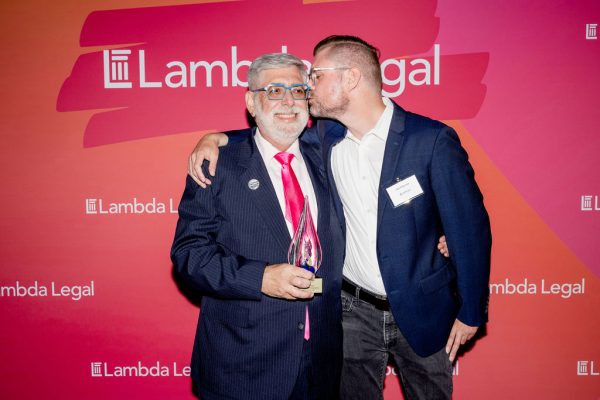
Jon says he was not open about his relationship with Syd because he anticipated that people would react badly, not understanding how being in a polyamorous relationship worked.
But at some point, the explainer-in-chief came to understand that that was being in the closet again. He felt some responsibility to let people know that it was okay and that it can work for some people, not for everyone. He says he just feels it’s important to fight against the lack of understanding and prejudice.
After giving tips on how to have such a successful, compatible, intergenerational relationship, Jon says, “I must admit – I never really thought we’d be together 21 years.”
“People need to figure out a way to survive,” Jon says in parting. “What I would add is for people not to give up hope – then the other side has surely won.”
Karen Ocamb is a veteran journalist and the former news editor for Frontiers Magazine and the Los Angeles Blade. This essay is cross-posted from her Substack LGBTQ+ Freedom Fighters. Please visit that cite to watch her in-depth video conversation with Jon Davidson about LGBTQ+ people and “strict scrutiny,” as well as the LAPD and other issues.
Features
Liliana T. Pérez-Palacios uplifts BIPOC, immigrant and queer rights with the L.A. Chargers
The L.A. Charger’s Sr. Director of Cultural Affairs talks coming out on national TV and making the local sports space more queer-inclusive.
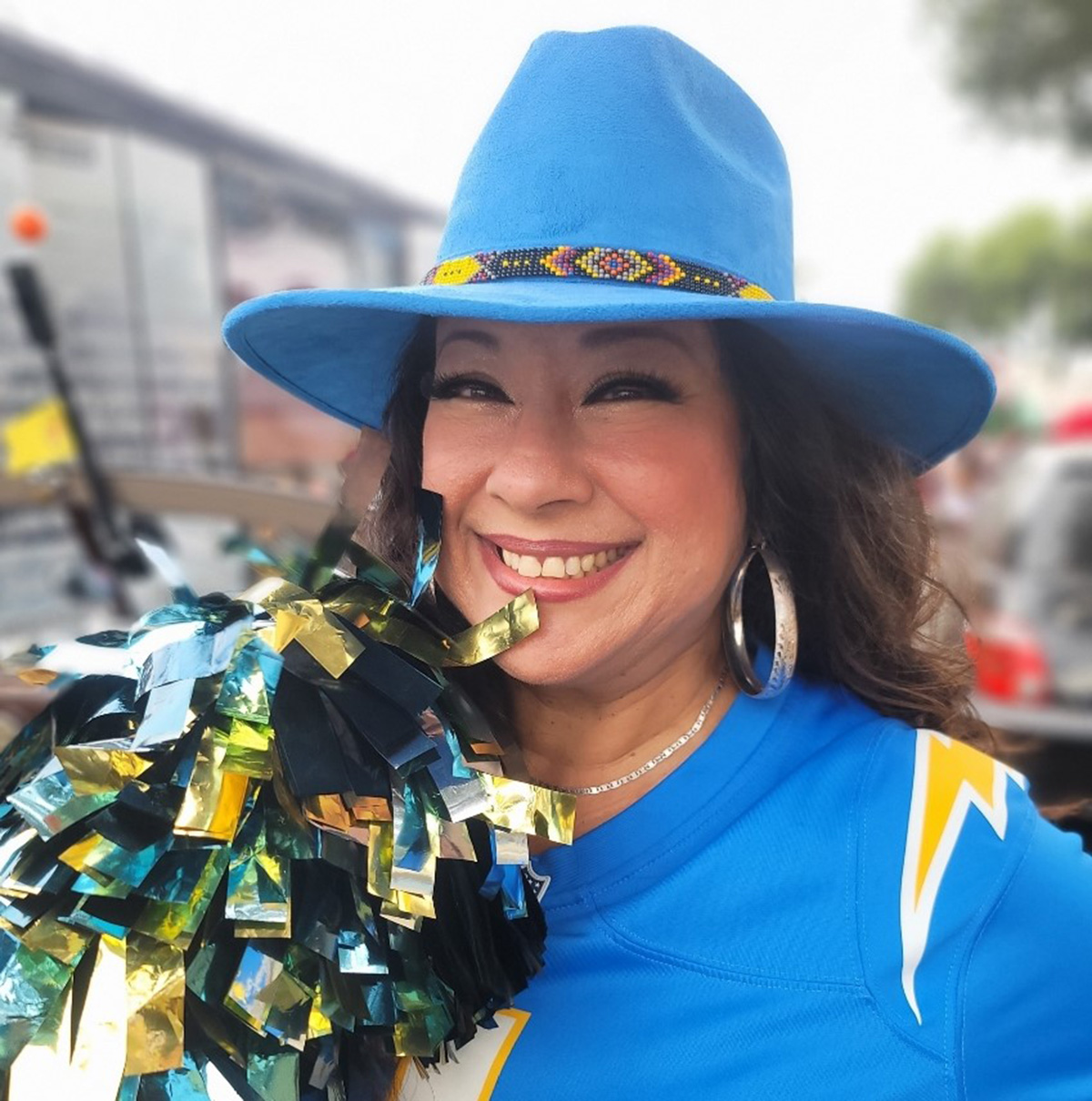
At an L.A. Chargers game, football fanatics donning powder blue and gold jerseys can be heard crying out: “Bolt up!” as players on the field tackle, run, and charge with an electric energy. People grip their seats, their eyes darting back and forth as they witness a kind of alchemy happening in front of them.
In the midst of this exuberant chaos, Liliana T. Pérez-Palacios mingles with Chargers fans, greeting them excitedly as they celebrate a sport that brings them closer to the community around them. Pérez-Palacios is the team’s Senior Director of Cultural Affairs, and her role allows her to exercise her greatest passion: uniting the city’s diverse tapestry of people and providing them a space to discover joy and belonging.
Growing up: navigating her queerness and activism
Pérez-Palacios’ childhood flitted back and forth between fear and empowerment, the two emotions woven into the fabric of her adolescence. As a toddler, she immigrated from Mexico to the U.S. with her mother, eventually settling in the county’s Pico-Union neighborhood. She remembers the persistent, looming threat of immigration officials and the constant presence of poverty.
But, rather than embed these fears into shame, she learned to translate and transform her struggle into affirmation, power, and self-liberation. “I don’t live by what others think of [or] say about me,” Pérez-Palacios told the Blade. “I need to live my truth, and that’s something that was instilled in me since I was a kid.”
Self-possessed and strong, Pérez-Palacios wanted to turn that courage outward and support other marginalized community members seeking refuge and comfort. As a student at Cal State University, Northridge (CSUN), she developed her passion for social justice, serving in student groups like Movimiento Estudiantil Chicano de Aztlán (MEChA), Strong Queers United in Stopping Heterosexism (SQUISH), and Students Against Apartheid.
“[I was] a young Latino kid, wanting desperately to help people like me feel welcomed and at home,” said Pérez-Palacios, who was inspired by the bold, “in your face” approach that organizations like AIDS Coalition to Unleash Power (ACT UP) adopted.
While her deep involvement with activism on campus led her away from her studies, this intense dedication to social justice led to a career in government service beginning in 1995. She served six Speakers for the California State Assembly as well as former California Governor Gray Davis.
Her civic engagement then caught the attention of Mayor Karen Bass in 2023, when she was appointed to be President of El Pueblo de Los Ángeles: a historic district that preserves the county’s Latine roots.
Coming out on national TV
Before these steps into local governance, Pérez-Palacios stepped into the limelight to advance queer visibility, even if it meant risking her closest relationships. She was in her early twenties when she heard that Cristina Saralegui, host of the major daytime Spanish-language talk show “El show de Cristina”, was making a tour stop in L.A. “No one was bigger than Cristina,” Pérez-Palacios recounted, who was determined to appear on the show to discuss the Latine LGBTQ+ community, and how it is impacted by suicidality.
Pérez-Palacios felt it was critical to discuss the mental health crisis amongst queer Latine youth, and came out as queer on the show in a brave display of personal solidarity. “I wanted to make sure that our community was never lost in translation,” she said. “Our lives are impacted by hate. I needed to put a face to it and say: Stop hurting us. We’re your family members too.”
She remembers her own family being shocked: there was the endless stream of opinions they threw at her for being openly queer. Her mother, whom she calls her best friend, “wasn’t ready for it” at the time. Still, Pérez-Palacios understood the gravity of the harm impacting LGBTQ+ people like herself, and this outweighed the potential rejection and ignorance she would receive in her own life.
Her mother came around soon after. “I’m her kid,” Pérez-Palacios said. “Her love is greater than anything else.”
Pérez-Palacios’ approach: creating an “orchestra” versus a “melting pot”
Pérez-Palacios credits her bravery to the importance of honoring the various identities that make up who she is. She fights for women, immigrants, Latine community members, and people impacted by poverty. “We’ve been trained to be ashamed,” Pérez-Palacios said. “[But] there’s no shame. If anything, there’s great pride there. We are communities of resilience and creation. When we don’t have anything, we create something.”
She leads with this ethos as she heads the development of cultural sensitivity and community-building at the L.A. Chargers. She is constantly looking for ways to bring different folks into the space and to help them embrace themselves in the celebration of the sport. The core of her work is being intentional about representing the rich cultural and social histories of L.A.’s eclectic communities: honoring their legacies of resistance, unity, and survival.
Today, she is excited about growing this “footprint” and bringing in more queer folks to the games. She hopes that by making this avenue of her professional career more inclusive, she can motivate the people around her to resist erasure and thrive together in each other’s unique origins and journeys.
“I hate the term, ‘melting pot.’ I do not want to be a melting pot,” Pérez-Palacios said. “I do not want you to be like me. I want us to be a beautiful orchestra. Together, through harmonizing, we create something amazing.”
Kristie Song is a California Local News Fellow placed with the Los Angeles Blade. The California Local News Fellowship is a state-funded initiative to support and strengthen local news reporting. Learn more about it at fellowships.journalism.berkeley.edu/cafellows.
Features
“We will get through all of this”: Culver City’s first LGBTQ+ Mayor discusses queer community and hope
Freddy Puza shares empowering words for queer youth and discusses his journey through local politics and advocacy.
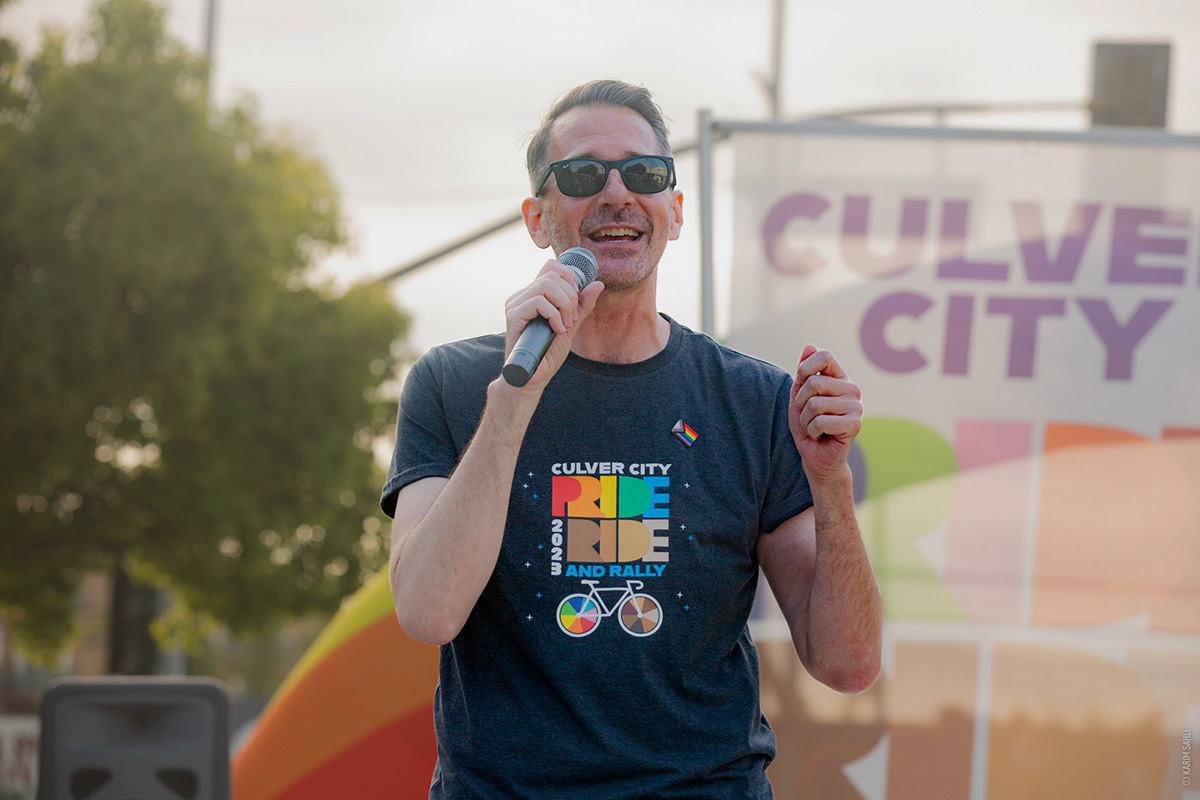
On Dec. 8, Freddy Puza was elected to be Culver City’s mayor, after a decade of dedicated service to the City. His journey of advocacy began after he moved to Culver City in 2011, when he immediately dove into local social services programs and activism.
In 2016, he banded together with fellow residents to call on Culver City to become a sanctuary city and protect its immigrant community members. In March 2017, its city council adopted a resolution that solidified this call to action. The resolution prohibits law enforcement officials from sharing data and information with immigration authorities.
Puza also volunteered on Culver City’s homelessness and general plan advisory committees before he was elected to the city council in 2022. Now, as mayor, he hopes to deepen his connections with fellow residents and build upon what he’s learned from his journey so far. “Every year that I’ve been on council, I’ve grown into a new person,” Puza told the Blade. “I see how the city and community work in a different way.”
His down-to-earth leadership approach centers on listening and making people feel heard: a feeling he struggled to find during his own coming-of-age. “That’s a lot of the work that I think the city council is responsible for,” Puza said, “We set policy, but we also create and maintain community. I want to make sure that everyone is folded into the process: that it’s an inclusive city, and that people feel like they belong.”
The Blade sat down with Puza to discuss how he first formed queer community and how he hopes to set a precedent for the way local government can stand up for and protect its diverse constituents.
Isolation in faith: growing up without queer community
When Puza was five, his family relocated from the Windy City to the suburban bubble of Irvine, California: sweeping him up in a whirlwind of transition and change. His parents were devoutly Catholic and found solace with other Catholic families. Charity, volunteering, and local involvement were also always emphasized at home, so there was the constant presence of others.
But in the midst of this persistent chatter and noise, Puza was alone. “I grew up in a faith community that wasn’t open to being gay, so it was really challenging to move through that,” Puza told the Blade. “While my friends were doing professional development, I was doing personal development and coming to terms with who I was.”
Throughout Puza’s childhood, LGBTQ+ representation was minimal, if not outright negative. People around him weren’t coming out or having open conversations about their gender or sexuality. Marriage equality hadn’t yet passed, and he was not in proximity to queer scenes and leaders modeling unity and pride as he searched for belonging.
Puza remembers feeling “petrified” at the prospect of being out, and waited to do so in college. He also decided to leave his faith community and focus on his mental health and self-acceptance. This became his turning point. “I think, when you embrace your identity, ‘like attracts like,’” Puza said. “When I came out, all of a sudden, I started to see LGBTQ+ people amongst me and in my environment.”
Culver City was the “Goldilocks” perfect fit
Puza moved to L.A. in 2001, bouncing from Venice to Silver Lake to West Hollywood before landing in what feels like his best fit. “I do consider Culver City the ‘Goldilocks’ [of these neighborhoods]. It’s just right,” Puza said. “It’s just home.”
He first sought out the region for its diversity and vast, boundless sense of opportunity. He joined organizations that focused on LGBTQ+ civil rights and protections like the Human Rights Campaign and Equality California, meeting friends and mentors who brought him more deeply into the local queer community. “It was so essential to have those people that I’m still friends with, who I’m so close with,” Puza said. “All of that combined really got me involved.”
Why Culver City specifically? “It’s a small city relative to Los Angeles, but there’s so much opportunity to get involved with local change,” Puza told the Blade. “Culver City residents get to know their council members, and there’s a lot of activism going on [here].”
Advocating for unhoused residents: Puza’s first foray into local government
When Puza first began volunteering in direct services to support unhoused residents living in Skid Row, he learned about systemic and structural barriers and issues that perpetuate homelessness in the county. This is when he began to understand that problems and solutions are intertwined, and both begin at the local level.
Inspired by the everyday leaders around him, Puza jumped into action and joined Culver City’s homelessness committee in 2015. “Many times, people get frustrated with the government and don’t see it as something that can bring actual change,” Puza said. “So the fact that I was seeing all these community members in Culver City engaging in change and really caring about their neighbors: that compassion moved me.”
Today: Puza’s hopes and aspirations as mayor
Currently, Puza is working with fellow Culver City city officials to build a clear five-year Capital Improvement Plan. This includes setting targets for infrastructural improvement projects as well as increasing housing affordability and sustainability while generating more revenue.
Culver City’s population is expected to double in the next decade or two, and the City remains in a structural deficit. Puza hopes to strategize ways to streamline programs and processes while creating new systems that can get the City “back on track.”
He is also focused on protecting the safety of his community members as fears surrounding Immigration and Customs Enforcement (ICE) agents are on the rise, especially with the recent ICE-related murders of Renee Nicole Good and Keith Porter. LGBTQ+ hate crimes are also on the rise, and queer rights are being targeted. Where the federal government fails, local governance and activism are revitalized, Puza says.
“People really do want to see the government deliver tangible things, and local government’s where that is at,” Puza told the Blade. “The federal government is not going to be helpful in the ways that are the most beneficial to community members. I believe in putting care for the individual, uplifting people, and giving them the tools to succeed: not punitive punishment.”
How can community members get involved?
There are many committees to join, as well as several open commission seats, according to Puza. He also encourages residents to directly get in touch with him or attend listening sessions where they can engage in dialogue with him and other community members.
“Those are really valuable opportunities to hear directly, and I want to always be listening to the community,” Puza said. “I want to make sure I’m in alignment with the community, and that the values that I set out with are still what the community and our residents want.”
And for queer youth and other LGBTQ+ people seeking belonging, the way he’d done years before, Puza offers this piece of advice:
“Find community and mentors who can help and guide you. It is a scary time, but I am a cynical optimist. So, I always believe, no matter what’s going on and how terrifying and horrible it is, we will get through all of this. You will make it. It will be tough, but have that strength inside to know yourself. I learned to love, accept and take care of myself, because we can’t give if we’re out of alignment. So really learn about yourself, and then go out there and don’t be afraid.”
Kristie Song is a California Local News Fellow placed with the Los Angeles Blade. The California Local News Fellowship is a state-funded initiative to support and strengthen local news reporting. Learn more about it at fellowships.journalism.berkeley.edu/cafellows.
Features
“We deserve to have a future here”: How we can support queer AAPI communities in 2026
This week, the Blade sat down with AAPI Queer Joy’s leader Jeff Deguia to reflect on his activism goals in the new year.
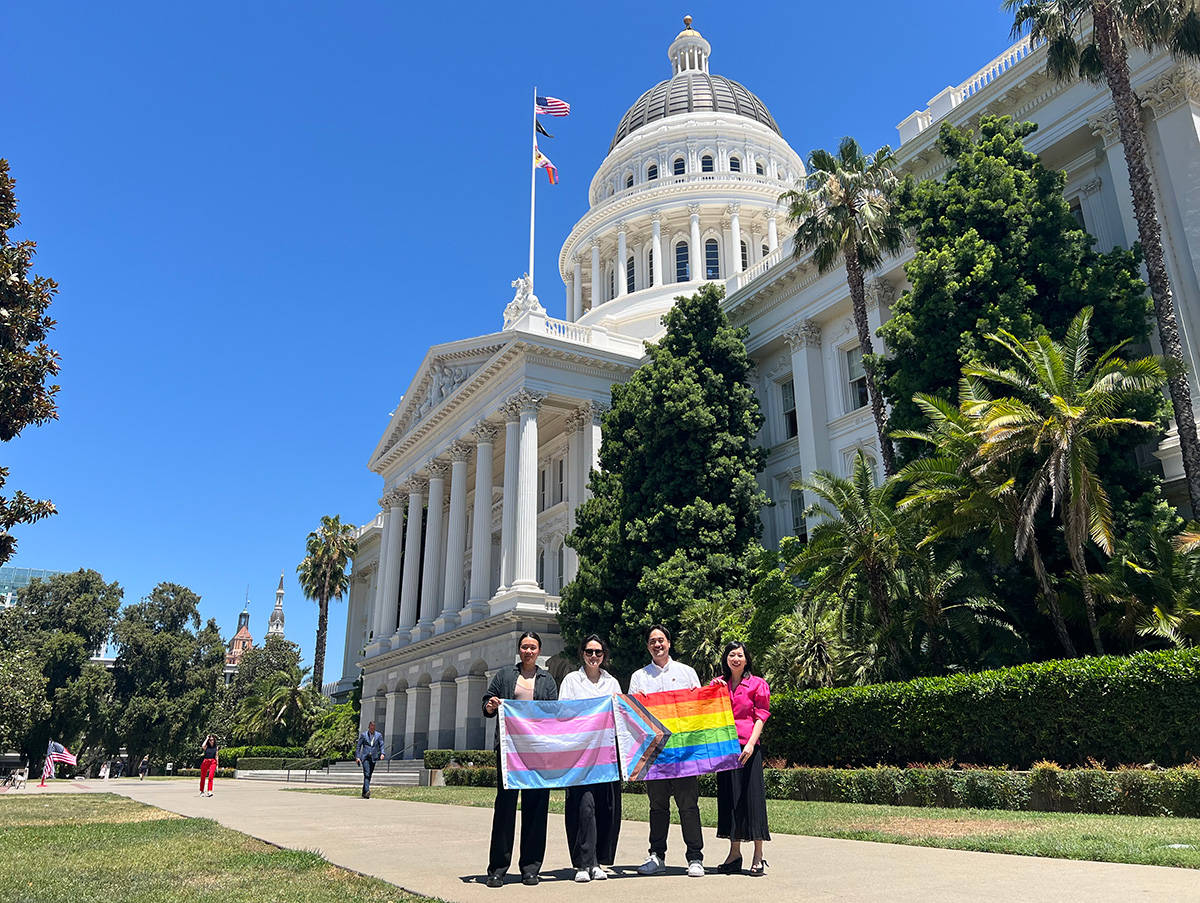
AAPI Queer Joy is a queer-led and focused coalition formed by Asian Americans Advancing Justice Southern California (AJSOCAL) policy advocate Jeff Deguia. In a previous feature, the Blade learned more about Deguia’s activism journey, from his Filipino American upbringing in Chicago to his exuberant, inclusive leadership in Los Angeles. We also interviewed Lan Le, a fellow AJSOCAL policy advocate and AAPI Queer Joy leader who is passionate about supporting other queer refugees and domestic violence survivors.
The coalition currently includes six grassroots civil rights organizations, including: AJSOCAL, Viet Rainbow of Orange County (VROC), the Bay-Area based Lavender Phoenix, Search to Involve Pilipino Americans (SIPA), Moonbow, and Hmong Innovating Politics (HIP).
AAPI Queer Joy formed in 2024, and that initial year was focused on increasing visibility and establishing the coalition’s existence. Last year, in 2025, AAPI Queer Joy began to amp up advocacy efforts, and each organization involved worked together to put together the coalition’s first-ever bill package.
This package included three bills: AB 1487, AB 678, and SB 418, focusing on expanding funding opportunities for two-spirit community members, creating an LGBTQ+ inclusive council on homelessness, and building stronger access to gender affirming care, respectively. The Blade reported on these bills in October.
Deguia found it fulfilling to dive into LGBTQ+ focused legislation and support his coalition members in bringing their advocacy work to the state level. Most of these partner organizations, like Viet Rainbow of Orange County, are hyper-local, aiming their on-the-ground efforts to specific regions.
They’re also small, with teams that often cap out at around 10 staff members. “They’re wearing a lot of hats,” Deguia told the Blade. “So for them to add to their capacity to do advocacy work and understand the importance: I’m grateful to them.”
This week, the Blade sat down with Deguia to reflect on AAPI Queer Joy’s growth in 2025, the challenges they faced, and how he hopes to grow the coalition in 2026.
Challenges AAPI Queer Joy faced in 2025
Deguia explained to the Blade that language access and cultural bridging can be difficult within the AAPI community, especially when it comes to having conversations around being queer with immigrant family members. “[For] certain LGBTQ+ vocabulary, there are no translations in AAPI languages sometimes,” Deguia said.
Tools like Google Translate have their limitations and don’t include the necessary cultural context needed to have sensitive discussions about identity and relationship-building. This often means staff members have to do additional work to translate certain terms and then ask their partner organizations for further support.
“We want to make sure that the LGBTQ+ community will feel understood, but also that their loved ones, their allies, parents, grandparents, and other folks will be like: Oh, this helps me understand what this word would be in language,” Deguia said. “So that’s definitely tough.”
Deguia and this reporter also discussed the concept of being “out” and how that experience is complicated for diasporic people who both live in the West and also belong to a different culture. In some Asian countries, where communal unity is valued over individualistic pride, being “out” should be treated with contextual nuance. Whether or not someone feels comfortable being out, Deguia hopes that community members make their choice through empowerment rather than shame or pressure.
“For AAPI people who are born here or raised here when they’re really young, [the question can be]: How do we make our own way and make sure that we’re living on our terms?,” said Deguia.
“Being out [can be a] proud moment, but understanding the cultural parts of being AAPI and not necessarily being out also has its own importance in the community. And saying that not being out is wrong, or having these really strong opinions on it, is unfair. That’s nuance and lived experience. It’s about cultural balance.”
How does AAPI Queer Joy hope to grow in 2026?
Deguia points to three main goals in this new year: seeking stories and inspiration from community elders, expanding the coalition, and organizing an AAPI Queer Joy event in L.A.
He hopes to lean on elders to better understand the lineage of activism before him, and to carve out a path built on history and imagination. While these elders had no “blueprint” of their own, Deguia hopes to hear their stories as they move towards a shared, intergenerational goal together.
“I’m building upon what has been done before me,” Deguia said. “I think about the folks who had everything set up against them, who believed: ‘I’m trying to get easier for someone after me.’ I’ve gotta understand my history so I can make a better path forward for [those] after me.”
When it comes to growing the coalition, Deguia has inclusivity at the forefront of his mind. He wants to include more partner organizations from the South Asian and Pacific Islander communities, which are often underrepresented in broader conversations around being AAPI.
“I don’t think I can call it AAPI Queer Joy without having reps from every part of that beautiful community,” Deguia said. “I [also] want to make sure that the whole state’s being represented well, like central California, SoCal, NorCal. There are communities that have a voice and want to show up and be in these kinds of conversations.”
To activate these communities, AAPI Queer Joy puts on their annual Jade Jubilee: an event that is both celebratory and productive when it comes to what the coalition has achieved and how they hope to strengthen its advocacy work. Jade Jubilee was organized in Sacramento last year, and Deguia wants to bring something on this scale to L.A. too.
“The QTAPI community in L.A. and Orange County is really rich and diverse,” Deguia said. “I want to showcase that there’s an organization based in L.A. here that is doing this work. I want to engage the community here more.” When thinking about accessibility and engagement, Deguia sees these potential local events as a chance to give friends and community members the tools, knowledge, and joy needed to move forward together.
How can we support AAPI Queer Joy?
Small actions can have large impacts. Deguia mentions the power of sharing the coalition’s social media posts, which often highlight their legislative campaigns and efforts, as well as supporting its partner organizations. There are grassroots groups out there who are connecting like-minded people: seek them out as a first step.
From there, you can learn about attending events and rallies, and understand the importance of individual efforts like calling representatives (which can also be done in community!) to voice your concerns and perspectives. Many of these local organizations provide scripts and workshops to ease fears and anxieties around these actions.
And, whenever possible, don’t turn away. It is demoralizing to see the constant threats to LGBTQ+ safety and rights, and the constant attempts to self-soothe are exhausting. But now, more than ever, it is necessary to understand what is happening around us and how we can empower one another with support, knowledge, and resistance. “If we turn our backs completely, forget and just live in our privilege, one day we’re gonna wake up, and things will be gone,” Deguia said.
Deguia: Being resilient and brave is something I wish we didn’t have to do all the time as queer folks, but [this moment] is asking for that. In a country and administration that’s telling us that we don’t have a right to exist, we have to be brave and tell them and show them that we deserve to be here like everybody else.
At the core of all the pain and all the fear, the core in our heart [has to be]: “I deserve to be here. I deserve to have a future here. My friends deserve to be here. Trans folks deserve to be here. I will do what I can in my power to make sure that we exist and we can live lives that are full of thriving and opportunity. Fighting and believing in our existence and our futures have to be at the core of how we live every day.
Kristie Song is a California Local News Fellow placed with the Los Angeles Blade. The California Local News Fellowship is a state-funded initiative to support and strengthen local news reporting. Learn more about it at fellowships.journalism.berkeley.edu/cafellows.
Features
Legendary organizing activist Dolores Huerta, 95, rides in AHF’s ‘Food for Health’ Rose Parade float
This year’s float honors AHF’s food banks, free farmers’ markets, veterans’ food programs, and massive SoCal wildfire food relief efforts for evacuees and first responders
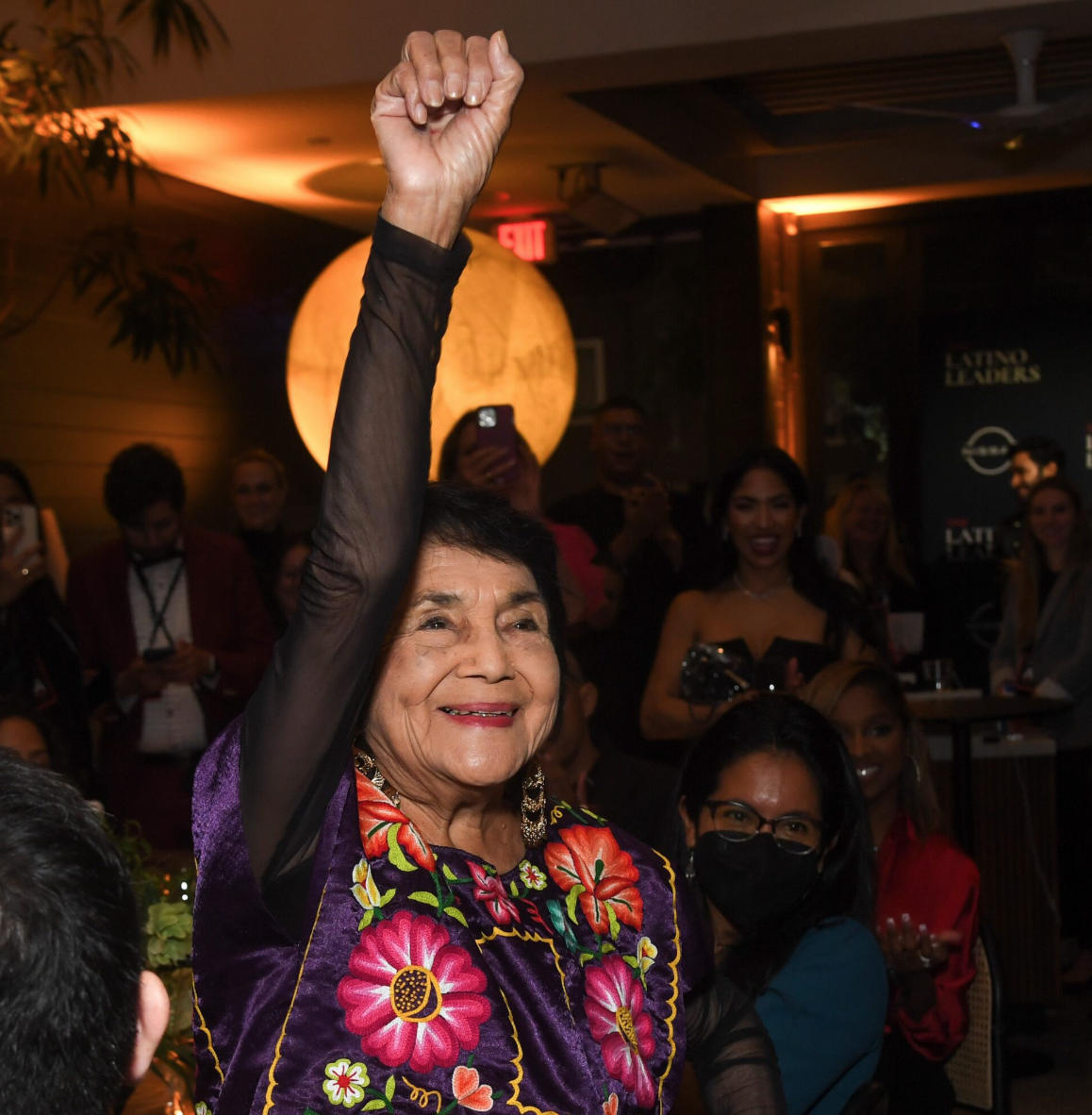
Need some inspiration for 2026? Fix your gaze on the Pasadena Tournament of Roses this Jan.1 to find the amazing, legendary civil rights and union activist Dolores Huerta riding on AIDS Healthcare Foundation’s “Food for Health” float in the Rose Parade – an incredibly fitting community tribute to the 95-year-old co-founder of the National Farm Workers Association (now United Farm Workers) with the late Cesar Chavez.

The AHF float spotlights the organization’s national initiative to combat hunger and food insecurity by providing nutritious groceries – including produce, bread, dairy, and other staples– to families and individuals in need. Their program is illustrated through “a vibrant ‘Jack and the Beanstalk’ motif, symbolizing growth, nourishment, and the power of community collaboration,” with oversized pumpkins, carrots, eggplants, and strawberries “representing the abundance that can bloom when people work together,” KTLA noted in a recent story. An overflowing farmer’s market truck is a tribute to “AHF’s volunteers and partners who served more than 75,000 meals to wildfire evacuees and first responders earlier this year.” (Click here to see KTLA’s report on the AHF float.) AHF reports that by the end of 2025, its Food for Health program “will have served over half a million people across the country with weekly groceries.”
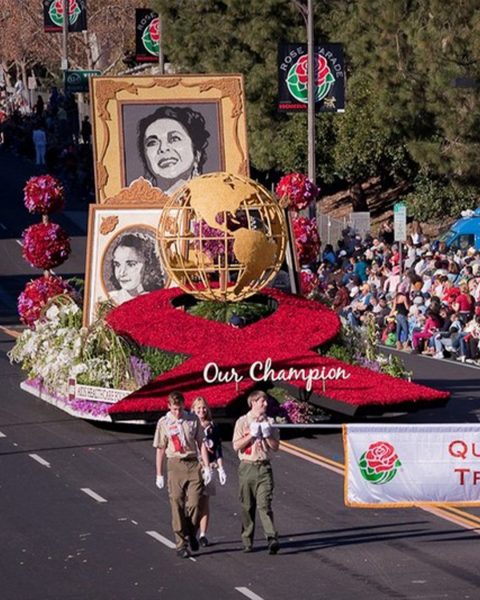
While AHF has a reputation for illustrating significant issues through the Rose Parade – starting in 2012 with their float tribute to “Elizabeth Taylor: Our AIDS Champion” – this year’s focus on food insecurity and the possibility of hope through community collaboration is particularly significant.
While Donald Trump calls today’s affordability crisis a Democratic “hoax,” many Americans believe their own eyes. “Roughly 9 in 10 U.S. adults, 87%, say they’ve noticed higher than usual prices for groceries in the past few months, while about two-thirds say they’ve experienced higher prices than usual for electricity and holiday gifts. About half say they’ve seen higher than normal prices for gas recently,” according to a Dec. 12 AP-NORC poll.
Meanwhile, while Congress may have temporarily saved Supplemental Nutrition Assistance Program (SNAP) from major drastic One Big Beautiful Bill funding cuts – SNAP helps approximately 1 in 8 Americans afford groceries – the bill added confusing new restrictions on who could receive food aid based on employment and immigration status, according to The Hill.
“The battle over SNAP isn’t over yet, either. States are still on the hook to rein in their error rates or face further funding cuts,” The Hill reports. “The Trump administration is also threatening to withhold benefits from states that don’t hand over data on participants, including their immigration statuses.”
Dolores Huerta personifies that intersectionality of people, of issues, and “the power of community collaboration.”
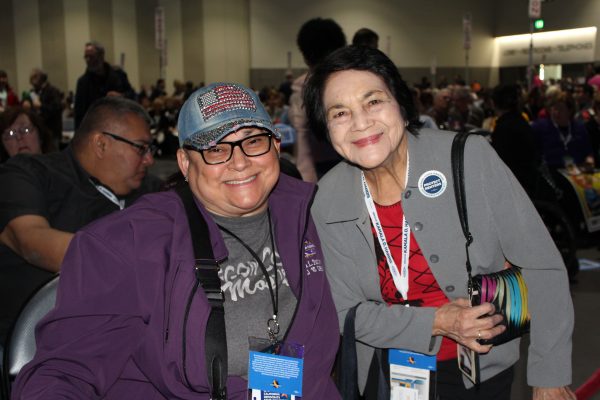
“AHF celebrates Dolores Huerta as a national treasure supreme. Dolores represents our unsung farm workers who, regardless of their status, toil so hard to put food on our tables. Yet, millions of people go hungry in the richest country in the world. The mission of AHF’s Food for Health could have no better representative than Dolores,” says AHF Co-Founder and President Michael Weinstein. “Dolores has also been a steadfast comrade in arms on LGBT and renters’ issues.”
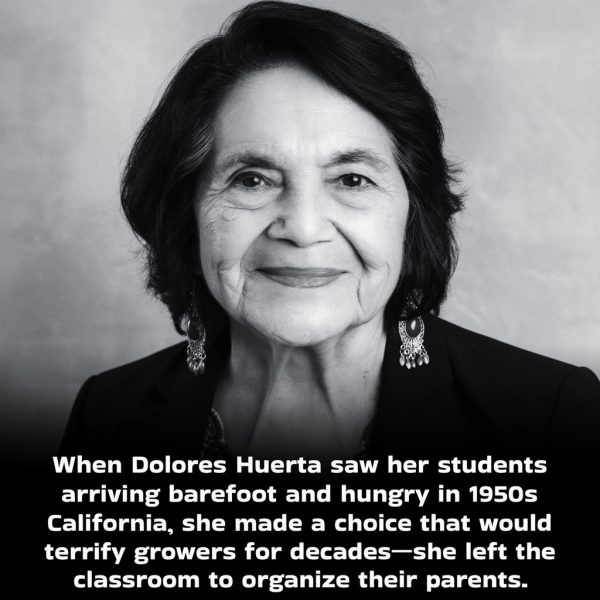
That Huerta advocates on renters’ issues is a natural extension of the mentoring she received from her independent mother, Alicia, who owned a 70-room hotel in Stockton, California, with affordable rates and breaks for low-wage workers. She was civically active and encouraged her daughter to appreciate cultural diversity in their agricultural community of Mexican, Filipino, African-American, Japanese, and Chinese working families.
Huerta got involved with the community, too, as well as earning a provisional teaching credential at the University of Pacific’s Delta College and getting married, and having two daughters. According to her foundation, “While teaching, she could no longer bear to see her students come to school with empty stomachs and bare feet, and thus began her lifelong journey of working to correct economic injustice.”
Her experience in leadership at the Stockton Community Service Organization led to her founding the Agricultural Workers Association, where she started a voter registration drive. In 1955, she married Ventura Huerta (with whom she had four more children), worked with Fred Ross to start the Community Service Organization, and met César E. Chávez. The two shared a vision to organize farm workers, and in 1962, they launched the National Farm Workers Association (NFWA). Huerta’s skills in lobbying, negotiating, and organizing led in 1963 to her securing the then-unimaginable Aid for Dependent Families and disability insurance for farm workers in California.
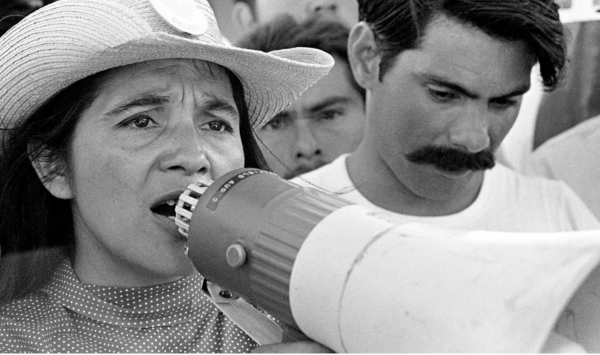
Huerta and Chavez saw NFWA as part of the larger civil rights movement and decided to back the Filipino-led Agricultural Workers Organizing Committee, an AFL-CIO labor union led by Filipino American organizer Larry Itliong, in what became the historic national 1965 Delano Grape Strike and boycott. Their coalition with the Student Nonviolent Coordinating Committee (SNCC) and the Congress of Racial Equality (CORE), as well as other union organizers and student activists, drew parallels between the Jim Crow South and rural California in the struggle for racial, social, and economic justice. By April 1966, the national boycott against Schenley Industries, the second largest grape grower in Delano, California, was so successful, Schenley agreed to sign a labor agreement with the NFWA, the union’s first, negotiated by Dolores Huerta.
In 1966, NFWA merged with the Filipino Agricultural Workers Organizing Committee to become the United Farm Workers Organizing Committee – later pared down to the United Farm Workers. Coalition building continued, including with prominent civil rights leaders and politicians, such as Martin Luther King Jr. and Robert Kennedy.
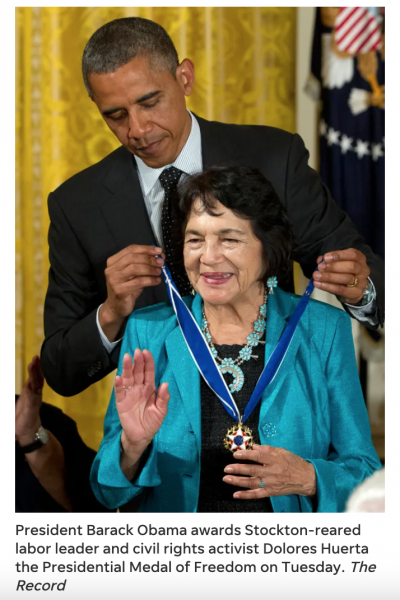
On May 29, 2012, President Barack Obama presented Dolores Huerta with the Presidential Medal of Freedom, saying she and the other honorees had “marked my life in profound ways.”
Obama also injected some humor into the ceremony in the East Room of the White House.
“Dolores was very gracious when I told her I had stolen her slogan, ‘Sí, se puede.’ Yes, we can,” Obama said, referring to his familiar 2008 campaign slogan. “Knowing her, I’m pleased that she let me off easy, because Dolores does not play.”
“Without any negotiating experience, Dolores helped lead a worldwide grape boycott that forced growers to agree to some of the country’s first farm worker contracts. And ever since, she has fought to give more people a seat at the table,” Obama said. She is one of those individuals who says, ’Don’t wait to be invited. … Step in there.’”
Huerta is a woman of action, including standing up for the freedom to marry for same sex couples, even though the fundamental right was disparaged by some in her Latino community.
“Our relationships with the ones we love and our Latino identities are two of the biggest reasons why we should care about equality for lesbian, gay, bisexual, and transgender people in America. When we see our Latino hermanos y hermanas harassed and held back simply for being who they are; when we can’t come together to celebrate a wedding for our gay friends; and when we know they don’t have the same opportunities we take for granted, it affects us personally,” Huerta wrote in a widely distributed June 14, 2013 essay for NBCLatino.
“I’ve spent my life championing both labor and civil rights causes and getting to know diverse perspectives; I’ve come to see that the struggles gay people face are intertwined with my own struggles,” she continued. “Let’s each do our part by being open about who we are, by accepting one another without shame or judgment, and by sharing our stories in every way possible. Whether it’s our hijos or hijas, hermanos or hermanas, or tíos and tías, we believe in the same freedoms for everybody, no matter who you are or whom you love.”
AHF launched in 1987 as AIDS Hospice Foundation with Michael Weinstein and a handful of friends trying to provide hospice care and advocacy for people with HIV/AIDS – “fighting for the living and caring for the dying” – during the Second Wave of AIDS when “freedom” often felt meaningless. The Chris Brownlie Hospice provided the last light of nurturing dignity.
Today, AHF is the world’s largest HIV/AIDS healthcare organization serving more than 2.8 million individuals across 50 countries, including the U.S. Recently, the nonprofit opened a new AHF Healthcare Center in Memphis, Tennessee, and another in Detroit, Michigan, bringing the total to 19 states, Washington, DC, and Puerto Rico. AHF services have also expanded to include food, shelter, disaster relief, and wellness services.“The responsibility of bringing as many people as possible into the lifeboat of care remains staggering, but is a challenge AHF will continue to take on,” Weinstein said on World AIDS Day.
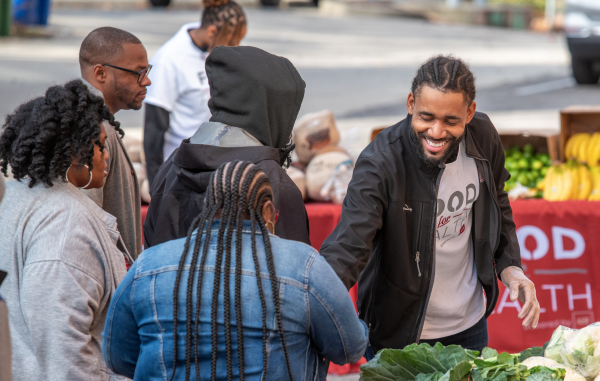
As the AHF “Food for Health” float steers down Colorado Boulevard in Pasadena on New Year’s Day, think of what “affordability” and “being of service” mean to you. Perhaps you, too, may be inspired by United Farm Workers Dolores Huerta or any of the other local heroes, or AHF staff and volunteers waving back at you, and join “the power of community collaboration.”
Karen Ocamb is a veteran LGBTQ+ journalist. This essay is cross-posted from her LGBTQ+ Freedom Fighters Substack.
Features
Where craft meets community: Inside Zion Liu’s and Christian Leon’s small biz ‘Here & Always’
In a season dominated by Black Friday frenzy and mass production, Here & Always rises above as a purpose-driven & queer-founded marketplace born from a desire to share beautifully crafted & deeply meaningful objects rooted in community
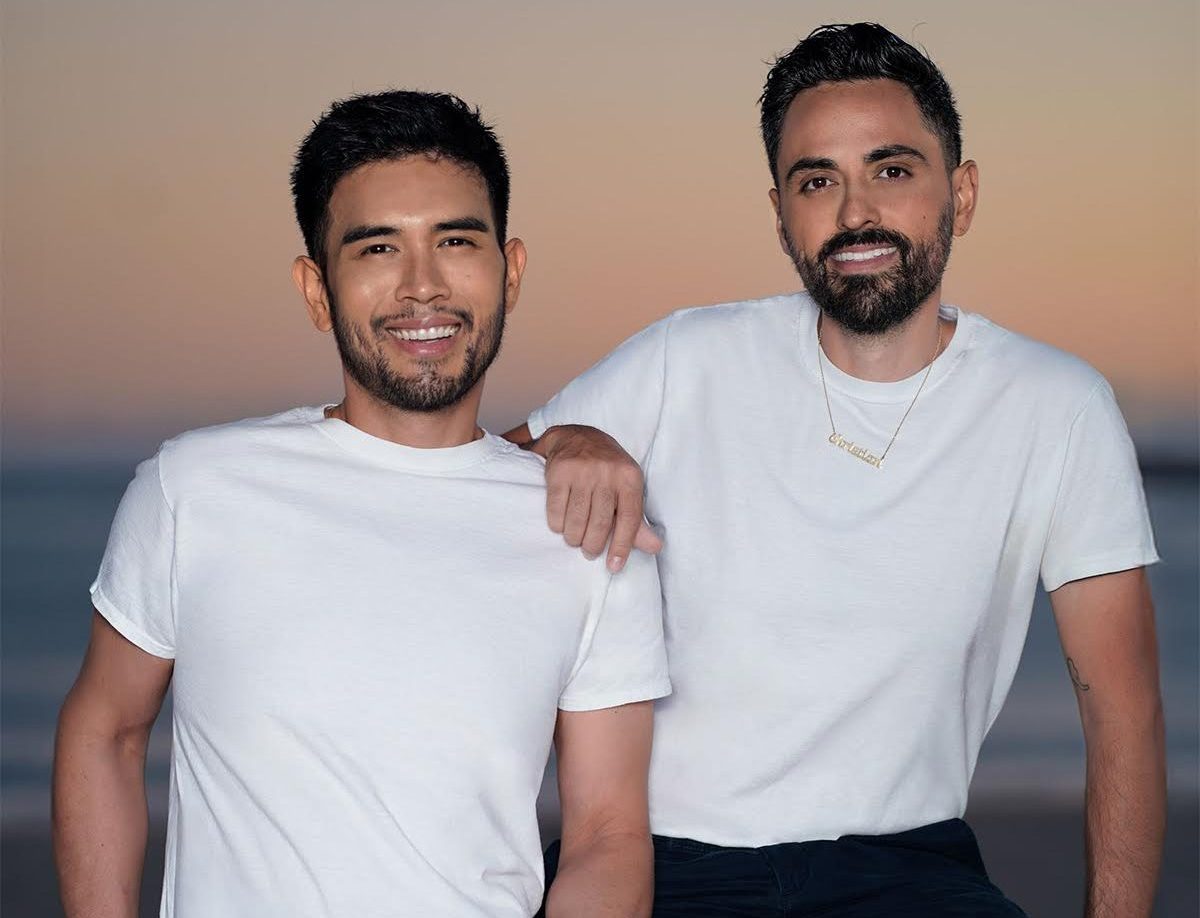
As Black Friday nudges consumers toward the trenches of Amazon, Here & Always stands in warm contrast – a slow, intentional marketplace built from heritage and heart. Founded by Zion Liu and Christian Leon, two queer, first-gen creators who couldn’t find a place that reflected their own identities or the makers that they admire, the brand was birthed from a simple desire: to gift beautifully wrapped, meaningful objects made by real hands and rooted in real stories. What began Liu and Leon’s love of gifting and design quickly evolved into a purpose-driven platform that uplifts queer, immigrant, independent, and allied artisans while reimagining what modern, values-led commerce looks like.
What ignited your inspiration to start an artisan marketplace, and when did you first realize it could grow into a business?
We built Here & Always because we could not find a place where we could gift beautifully wrapped, intentional pieces made by hands and hearts that reflected our own. Queer, first-gen, immigrant, independent, and allied makers all in one place, in one easy experience. So we set out to build it.
The funny part is that it did not start as “let’s build a marketplace.” Zion has always dreamed of a Candy Spelling–level gift-wrapping room, and I am the person who goes way too hard for holidays and gifting. We are both obsessed with home, renovation, and timeless design, so we knew whatever we did together would live in that world of objects and beauty.
Last year we left corporate life to build something with purpose. The first idea was simple: wrapping paper and packaging that reflected the diaspora of LGBTQ+ life, chosen family, and our family roots. The plan was to sell on an existing marketplace and keep it moving.
Then we saw how those platforms actually work, how they profit even when small brands do not, and how quickly major retailers were rolling back DEI and treating “support” as seasonal marketing. That was the turning point. Here & Always stopped being a single product and became a home: a marketplace built by us, for us, where value flows back to makers and the communities they come from, and where the person behind the work is never erased. That is when we knew it could and should be a real business.
Eighty percent of your founding brands are LGBTQ+-owned. Why was queer representation essential to the DNA of Here & Always?
Queer representation is essential because it is our reality. We are queer, and the people who shaped our taste, our sense of home, and our idea of beauty have always been queer, too. For decades, queer makers have set the tone for culture, but they are rarely the ones who benefit when their ideas go mainstream.
At Here & Always, that had to change. Most of our founding brands are LGBTQ+-owned, and alongside them are our allies from immigrant, Black, Brown, and Asian communities who share these same values. Representation is not a seasonal campaign for us; it is the foundation of our marketplace. Diversity is not the side story; it is the core. Structuring the business this way lets us redirect money, visibility, and long-term opportunity back to the communities that have always been quietly leading the way.
Your brand is rooted in heritage, queerness, and community. How have your personal identities influenced the aesthetic or themes of your brand?
Our aesthetic really started at home. Long before Here & Always, we were renovating and restoring homes after we’d worked our day jobs. Our last project before this brand came to life was a midcentury house we restored stud by stud, doing a lot of the work ourselves. We’ve also never been fast-commerce consumers; we would rather save for one beautiful object than buy five disposable ones. Everything we brought home had to feel timeless, well-made, and built to last for years. That lens is baked into the brand.
Layered on top of that is who we are: queer, children of immigrants, raised in Los Angeles. We grew up around altars, candles, plastic-covered sofas, crowded tables, and objects that carried huge emotional weight. Those memories show up in Here & Always as “everyday luxuries” that feel a little sacred: candles, matchboxes, keepsakes, and home pieces that are meant to anchor a space, not just decorate it. The result is an aesthetic that feels like a lived-in shrine, clean and design-forward, but full of story, heritage, and a sense of community you can actually feel when you hold the objects.
Let’s talk challenges. What are some of the biggest obstacles you’ve faced as a small business owner, and how did you come out the other side?
Taste vs Values. We refused to choose between design and thoughtful sourcing. That meant more research, more conversations with artisans, and saying “not yet” to products that were almost right.
Craft vs Margin. Reusable keepsake packaging, recycled materials, and small-batch production don’t automatically play nice with startup math. We quickly learned to redesign, simplify where needed, and remove anything that didn’t add meaning along the way.
Infrastructure vs Story. We’re a marketplace, not a single-SKU brand. That meant building all the tech/ops (Shopify stack, fulfillment logic, product data, reviews) while writing a story that could hold many voices and still sound uniquely like us.
If you could collaborate with any artist, company, or creative, who would it be and why?
Because Here & Always is built around multiple brands, it never feels quite right to single out a “dream” collaborator without making others feel lesser by omission. In many ways, we are already collaborating with our dream partners: the artisans and studios who trusted us early and whose work shapes the soul of the marketplace.
More broadly, our ideal collaborators are people and institutions who treat objects as portals, not just products, and anyone who cares as much about story and community impact as they do about design. If a collaboration helps us pour more resources back into makers and the communities we love, then that is the kind of “dream project” we are excited to say yes to.
How has the cultural and political climate around queer and immigrant communities shaped your mission?
Being queer-founded and LA-based is our foundation. Our identities and origins inform everything we do. We have learned that visibility matters, that luxury does not have to exclude queer, BIPOC, immigrant, or allied communities, and that home can be a sanctuary of authenticity instead of a place where you shrink yourself.
Los Angeles is a city of reinvention and layers. It reminds us daily that culture is not homogeneous, that style and substance can coexist. Against a backdrop where social and political pressure on marginalized identities is very real, we are not interested in building only as a reaction to harm. We are building for what is possible: a marketplace where queerness or diversity is not a search filter but part of the fabric, where the makers we uplift reflect a wide spectrum of identities and experiences, and where “good taste” is not coded for a select few.
That climate also makes the work feel like a responsibility. Being rooted in LA means engaging with community, supporting local artisans while holding a global perspective, and aiming for a ripple effect—job creation, visibility, and a more inclusive idea of luxury. For us, it means every object that ships from Here & Always carries the imprint of someone who did not have to leave their identity behind to make something beautiful. That matters now more than ever.
Do you feel small businesses have a responsibility to take a stand on social issues, or is it best to stay neutral?
We do not believe there is a single rule every small business has to follow. Safety, resources, and context all matter. But we also know that for many of us, especially queer- and immigrant-founded brands, “neutrality” is not really neutral; it often defaults to the status quo.
For Here & Always, our fight is the same fight as the communities we come from, so we chose to build our values into the structure of the business instead of only into statements. We take an activism through craft approach: beauty and design come first, and then there is this “nice surprise” that your purchase is supporting small-batch artisans, queer and BIPOC makers, and giveback initiatives.
We would rather invite people in than lecture them. A lot of our customers are still learning how predatory big marketplaces and mass retail can be; we were too, until we started building our own. So our role is less about telling everyone what to think and more about creating a different model in practice, and letting people discover that they are part of something bigger than just the object in their cart.
Growing up in Los Angeles as children of immigrants is central to The Purpose Candle Collection. What childhood moment or memory most encapsulates that sentiment or experience for you?
The Purpose Collection is really three chapters from our lives and our co-creator Earthy Corazón’s life. We are all children of Latino immigrants, and you can feel that most clearly in the scent we now call Mezcal Moon. In testing, its working name was “Sunday Cooking With Family,” which is really the core memory.
For us, Sundays in Los Angeles meant gathering with the family for the carne asada. There is a fire growing in the grill, tías and tíos dropping by, cousins running through a too-small apartment or backyard, someone putting on music while the TV hums in the next room. You smell food being prepared, share old stories and make new ones.
Mezcal Moon was built to smell like that, like being held by family, by food, by memory. It is our way of bottling that specific experience of growing up as children of immigrants in LA and turning it into something you can light, wherever you are, when you need to feel that kind of home again.
What does it feel like to see customers resonate with products grounded in queer and immigrant narratives?
We are still at the very beginning, so every order feels personal. Any time someone chooses to spend their money with us, especially in a crowded market, it lands as a real act of trust.
When that choice is for a product rooted in queer and immigrant stories, it feels like a double affirmation: that our communities deserve to be centered, and that there is room in “luxury” for narratives like ours. It is validating and humbling at the same time.
We built Here & Always so people could see themselves, their families, or the people they love reflected back in what they gift and keep. To watch even the first wave of customers respond to that makes all the risk and work of starting feel worth it.
You describe your approach as “regenerative commerce.” In your experience, what does giving back more than you take look like in practice?
For us, “regenerative commerce” is a simple test we put against every decision: does this give back more than it takes, from people, from community, from culture?
In practice, that looks like a few things. On the product side, it means prioritizing small-batch, thoughtfully made objects over disposable trends, and working with artisans who are already trying to tread lighter in terms of materials and waste. On the people side, it means structuring our marketplace so makers can actually thrive, respecting their pricing, not squeezing margins to the breaking point, and centering queer, BIPOC, and our allies’ brands instead of treating them as a seasonal feature.
And on the community side, it means building giveback into the model, not just into marketing. A portion of what we do is always pointed back toward impact partners and on-the-ground work. The aspiration is that every product gives back, every purchase uplifts, and every story matters, not just in theory, but in the way money, visibility, and opportunity move through the business.
Why was it important to you that 100% of profits from The Purpose Candle Collection support community partners like Make Good, Inc.?
The Purpose Collection was born to be a proof point of that philosophy. We did not want a “greenwashing” donation model; we wanted a line where the primary job is to fund impact.
Giving 100% of profits from this collection to community partners like Make Good, Inc. was our way of saying: this is what a for-purpose business can look like. We want our entire marketplace, over time, to be using profit for good, not for greed or distant shareholders, and the Purpose Collection is the start of that, a clear line connecting beauty, story, and real-world impact.
Here & Always is described as a movement. Five years from now, what impact do you hope this movement will have on makers, customers, and culture?
We call it a movement because when you shop with Here & Always, you’re not just choosing something beautiful. You’re helping small businesses grow, redistributing economic power, and building a more equitable supply chain one gift at a time. Every product is made by real hands, real people.
Five years from now, we hope that shows up clearly. We want our communities to be thriving, hiring teams, raising their prices with confidence, and feeling supported by a marketplace that protects their value instead of eroding it. We want our customers to expect that the most beautiful objects in their homes can also be the most ethical and story-rich, and to see their purchases as a quiet way of voting for the world they want.
Culturally, the goal is for this model to feel less radical and more like the norm. If in five years it is completely unremarkable that a “luxury” marketplace is queer-founded, values-led, and transparently supporting small-batch artisans, then we will have done our job. Here & Always is our way of redefining commerce as something sustainable and regenerative, where every story and every purchase can move things a little closer to the world we want to live in.
Visit HereandAlways.com
Features
Trump’s shocking White House East Wing amputation — and the painful fallout Americans won’t ignore
Gay Social Secretary Jeremy Bernard on the importance of civility
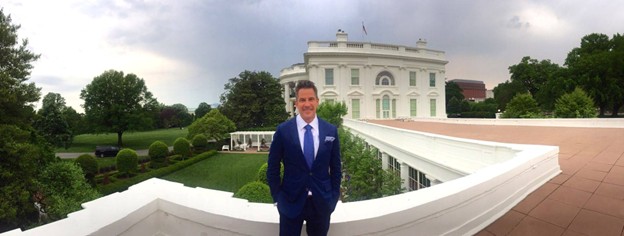
Since Jan. 20, 2025, life in Donald Trump’s divided America has been a series of jaw-dropping split-screen scenarios, flashing at an even faster pace since the resounding anti-Trump, pro-affordability Democratic electoral victories on Nov. 4. But while the weeks before Thanksgiving have injected hope that the No Kings marches, the rule of law, and the 2026 midterms will uphold democracy, Trump’s violently oriented MAGA and Christian National base and his committed Project 2025 backers continue remaking the federal government and fighting the culture wars.
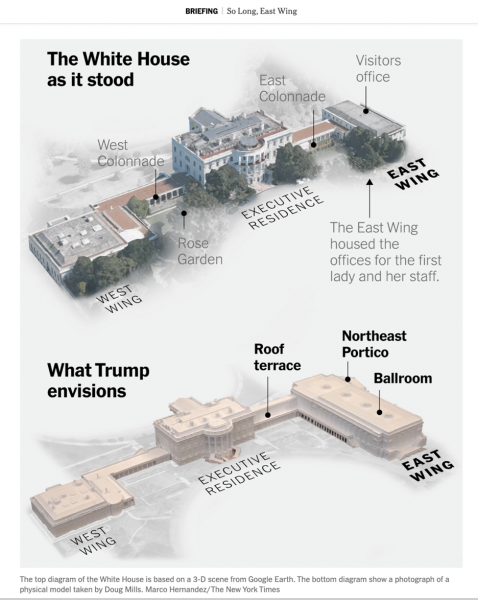
Luxuriating in his own narcissism, Trump ordered the clandestine demolition of the East Wing on Oct. 23 to make way for his 90,000 square foot ballroom. He apparently didn’t care about the national shock at the brutal amputation of America’s beloved cultural arm that balanced the hard political arm of the People’s House.
“This isn’t a real estate deal. This is a living, breathing building. It actually hurts, as a citizen. It’s us. It’s our home. This doesn’t belong to anybody except the blood, the sweat and the tears of every president,” new Washington, DC resident Roseanne Siegel told NPR.
“For historians and for Americans who love their history, this is a big blow,” said ABC News presidential historian Mark Updegrove.
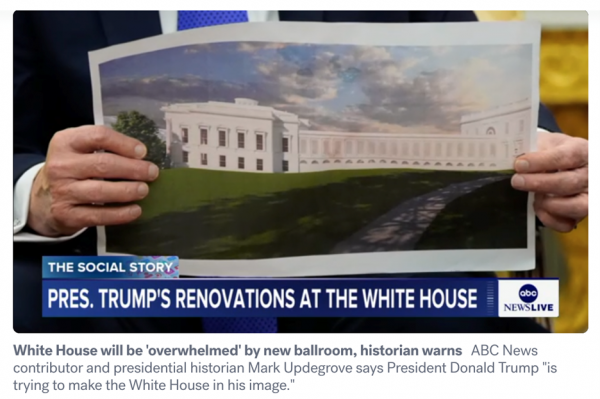
According to an Oct. 30 poll from the Washington Post, ABC News, and Ipsos, 56% of respondents disagreed with Trump’s move while 28% favored it. An earlier Yahoo/YouGov poll found 61% of respondents rejected Trump’s ballroom plan while 25% supported it.
Trump lied. “It won’t interfere with the current building,” Trump said last July about his ballroom plans. “It will be near it, but not touching it. And pays total respect to the existing building, which I’m the biggest fan of. It’s my favorite,” “He was dishonest about his intent in terms of we’re not going to touch anything, like it’s going to be close, but not touching,” Kevin Wade, a 52-year-old tech tourist from Texas, told Reuters. “And then now we’re completely demolishing it.”
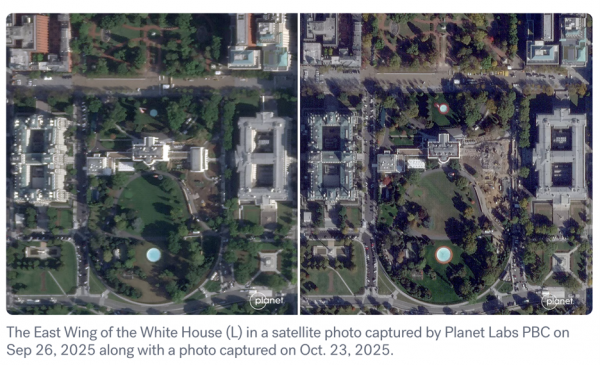
The East Wing emptiness is now a tourist attraction, a PTSD imprint that – with the rapid developments leading up to Thanksgiving – may inspire a turning point in Trump’s presidency.
On Tuesday, Nov. 18, after a 43-day government shutdown to avoid this moment, the House of Representatives voted 471-1 to compel the Justice Department to release all files on convicted child sex offender Jeffrey Epstein.

Meanwhile at the White House, Trump gleefully hosted Saudi Arabia’s crown prince Mohammed bin Salman (MBS) – who US intelligence believes approved the gruesome 2018 murder of Washington Post columnist Jamal Khashoggi. The president scolded ABC News journalist Mary Bruce for embarrassing “guest” MBS with “a horrible, insubordinate” question about Khashoggi’s murder. “Whether you like [Khashoggi] or didn’t like him, things happen.”
In Bob Woodward’s 2020 book, Rage, Trump reportedly bragged about shielding MBS: “I saved his ass,” getting Congress “to leave him alone.”
Meanwhile, after the House vote, Epstein survivors huddled at a news conference, holding up photos of themselves as teenagers and young women, asking if Trump is innocent, what is he hiding? Why won’t he release the files now? Suddenly, thrilled survivors learned that the Senate had unanimously passed the Epstein Files Transparency Act and sent it to Trump for his signature.
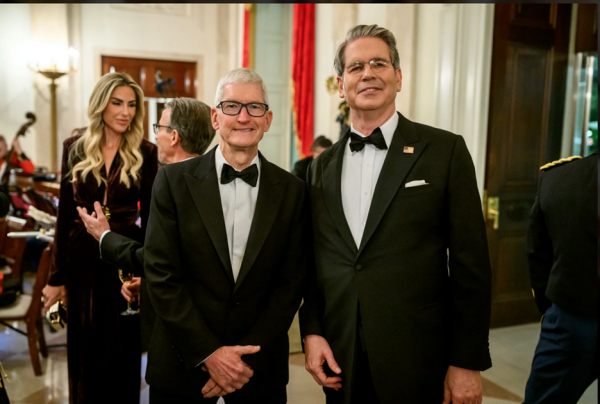
Cut to Trump hosting a black-tie dinner for MBS with lots of rich men who do business with the Saudis. The next morning, he announced that he had signed the Epstein bill, with a 30-day deadline.
“It was a remarkable turn of events for what was once a far-fetched effort,” AP reported. “Trump did a sharp U-turn on the files once it became clear that congressional action was inevitable.”
Trump needed a distraction.
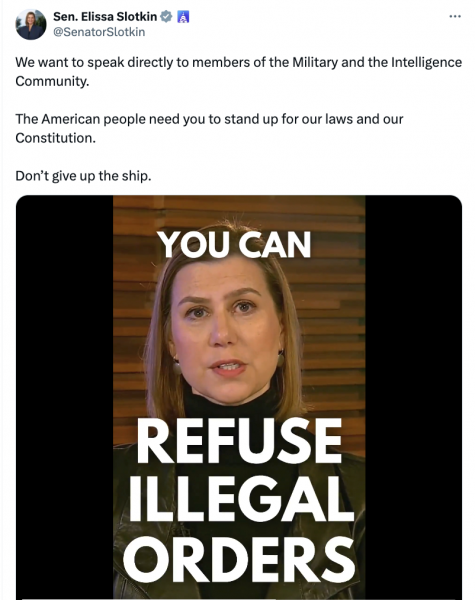
Early Tuesday morning, Nov. 18, Democratic Sen. Elissa Slotkin posted a 90-second video on her X account calling on U.S. servicemembers to not obey unlawful orders.
“The American people need you to stand up for our laws and our Constitution,” said Slotkin with five other fellow military veterans – Arizona Sen. Mark Kelly, and Reps. Jason Crow, Chris Deluzio, Maggie Goodlander, and Chrissy Houlahan. “Don’t give up the ship.”
The Uniform Code of Military Justice says troops who disobey a direct order will be punished. But servicemembers and officers also have an obligation to reject any order they deem is unlawful, a reference to the “I was only following orders” Nazi defense during the Nuremberg trials.
There is cause for concern. In his first term, Trump asked about shooting unarmed civilians protesting the murder of George Floyd. In his second term, Trump has threatened to use the Insurrection Act to deploy troops, “unleashed” police, federalized National Guard, and masked and violent ICE and Border Patrol agents in American cities.
“The president was enraged,” Trump’s 1st term Defense Secretary Mark T. Esper told NPR. “We reached that point in the conversation where he looked frankly at [Joint Chiefs of Staff] Gen. [Mark] Milley and said, ‘Can’t you just shoot them, just shoot them in the legs or something?’ … It was a suggestion and a formal question. And we were just all taken aback at that moment as this issue just hung very heavily in the air.”
Trump found his distraction on Thursday, Nov. 20, reposting a Washington Examiner story about the Democratic lawmakers’ video, adding that it was “really bad, and Dangerous to our Country. Their words cannot be allowed to stand. SEDITIOUS BEHAVIOR FROM TRAITORS!!! LOCK THEM UP???” In another post he said it was “SEDITIOUS BEHAVIOR, punishable by DEATH.”
Trump also reposted a @P78 comment: “HANG THEM GEORGE WASHINGTON WOULD !!” Bomb and death threats against the Democratic vets “surged”. Senate Democratic Leader Chuck Schumer said Trump was ‘lighting a match in a country soaked with political gasoline.’”
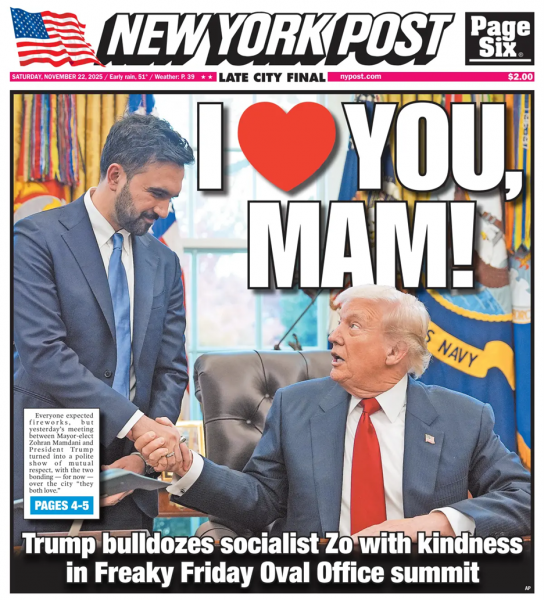
Cut to Friday. 34-year-old New York Mayor-elect Zohran Mamdani met with Trump, who had vilified the Democratic Socialist. But inexplicably, the meeting turned into an Oval Office lovefest, with an almost giddy Trump, 79, saying it was “OK” that Mamdani had called him a fascist. He promised to help the city.
That night, longtime Trump and MAGA loyalist Rep. Marjorie Taylor Greene announced she’s resigning from Congress, effective Jan. 5, 2026.
Greene criticized Trump over “America First” and health insurance policies but a major split occurred when she sided with Epstein survivors over him. Trump called her a “traitor” and vowed to back a primary challenger.
“Loyalty should be a two-way street,” Greene said in her 10-minute video. “I refuse to be a battered wife hoping it all goes away and gets better.”
No one knows what’s coming next.
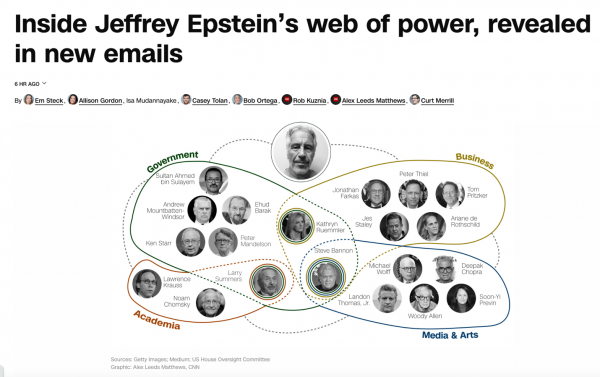
But for the LGBTQ+ community, there are other important split screens amid Project 2025 erasure – such as out California Rep. Robert Garcia’s key role as ranking member of the House Oversight Committee focused on transparency and justice for Epstein survivors.
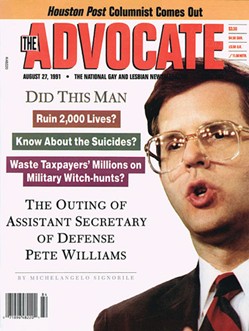
And while Trump was threatening Democratic lawmakers with death on Thursday, Pete Williams, a former NBC News correspondent and press secretary for Vice President Dick Cheney, spoke at Cheney’s funeral at the National Cathedral. Williams told the mostly old-fashioned Republicans how he offered to resign in 1991 when The Advocate was about to out him as gay. Cheney – who loved his semi-out lesbian daughter Mary – said no and checked on him after the story was published. During the horrific AIDS crisis in the early 1990s, ANGLE (Access Now for Lesbian and Gay Equality) fundraised and worked to elect pro-gay politicians. In 1991, longtime gay politico David Mixner introduced ANGLE to his friend, Arkansas Gov. Bill Clinton, whom the group helped elect as president.
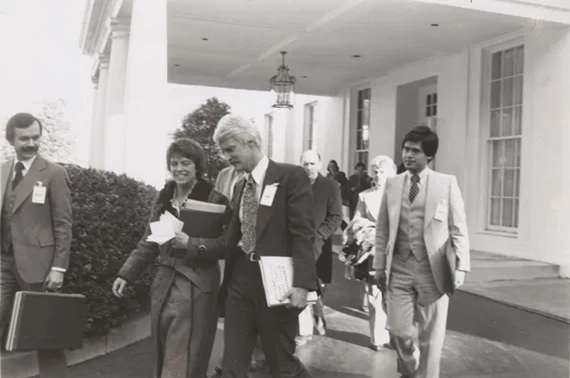
Gay people were not welcome at the White House until Clinton, other than one historic visit on March 26, 1977. Decades later, when ANGLE’s Jeremy Bernard was being interviewed by First Lady Michelle Obama for the job of Social Secretary, he recalled how difficult it was to get through the East Wing visitors’ entrance during Clinton’s administration.
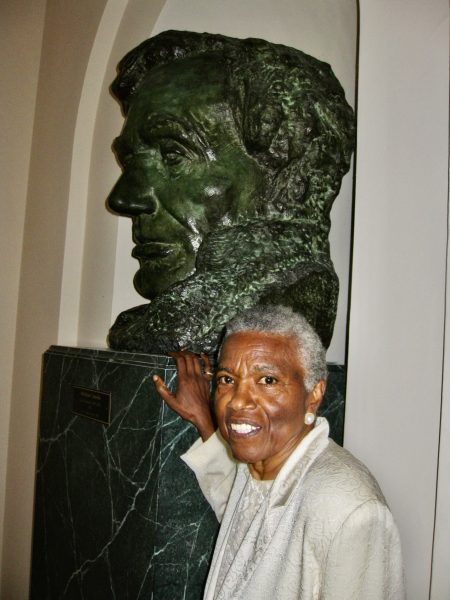
“I said to Mrs. Obama, ‘It takes a lot to get in these doors. And I think it’s very important for people to feel very welcomed,’” Jeremy says during a recent conversation.
The First Lady agreed and “wanted to make sure as many people that never had been to the White House and never thought they would be, got the experience to do it.”
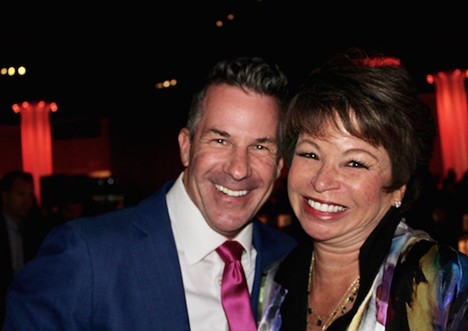
Jeremy worked for Obama’s presidential campaign in 2008, then as White House Liaison to the National Endowment for the Humanities before serving as Senior Advisor to the US Ambassador to France. On Feb. 25, 2011, he became the first male and first openly gay person to serve as Social Secretary.
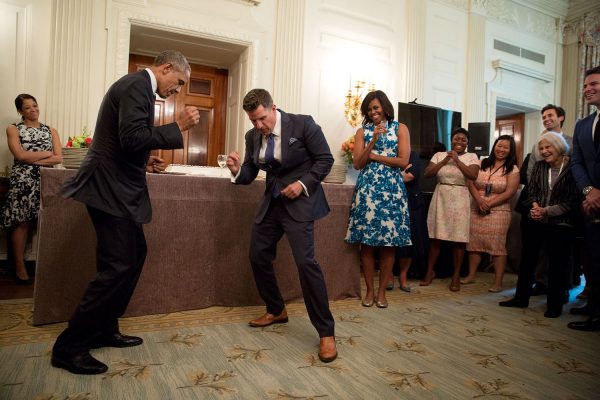
“Jeremy shares our vision for the White House as the People’s House, one that celebrates our history and culture in dynamic and inclusive ways. We look forward to Jeremy continuing to showcase America’s arts and culture to our nation and the world through the many events at the White House,” President Obama said in a press release.
“My office was in the East Wing, and I had what I thought was the best office. I looked over toward the South Lawn, but I also had the roof of the East Colonnade below me. I had a window that actually would open like a door, and you could walk out onto the roof as if it was a patio,” Jeremy recalls, noting that he was warned to call the Secret Service before going out to avoid getting shot.
“I was so shocked,” Jeremy says about the East Wing being demolished. “When I first heard there were bulldozers, I was like, well, what is it they’re knocking down from it?” – finding out later, “the whole thing” was gone.
He felt “some self-sorrow” and “numb” remembering his office. “It really is a part of history, not just for those of us that worked there, but for virtually everyone – whether you were there for a state dinner, a holiday party, or a reception for St. Patrick’s Day, LGBT celebration – whatever it was, everyone came through the East Wing.”
California Gov. Gavin Newsom said it well, Jeremy says. “Compared to what ICE is doing and all that, it may not rank up there, but it’s symbolic of what’s happened in our country.”
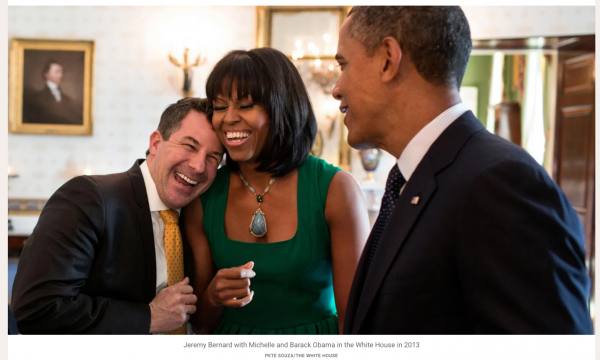
First Lady Michelle Obama said it well, too. “We always felt it was the people’s house,” she told CBS “The Late Show” host Stephen Colbert. “I am confused by what are our norms? What are our standards? What are our traditions? I just feel like, what is important to us as a nation anymore? Because I’m lost.”
And, Obama continued, “I hope that more Americans feel lost in a way that they want to be found again, because it’s up to us to find what we’re losing.”
“The West Wing was work — sometimes it was sadness, it was problems. It was the guts of the White House,” she said. “The East Wing was where you felt light.”
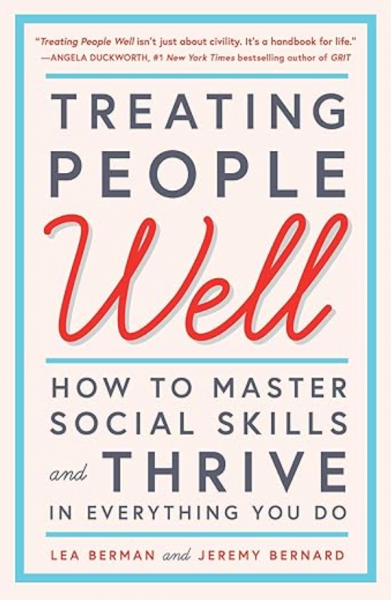
Jeremy and Lea Berman, Social Secretary in the George W. Bush White House, have some suggestions in their book “Treating People Well,” subtitled “How to Master Social Skills and Thrive in Everything You Do.”
“It was important to us to see that despite our differences in how we viewed policy, Lea and I and Lea’s husband – who is an operative in the Republican Party – were very close,” Jeremy says.
“I think about what this must be like for kids,” Jeremy says. “We always looked at these presidents as a certain type of person.”
But now people hear Trump say, “’I hate my enemies. I want revenge.’ What is that teaching kids?” Jeremy asks. “The President of the United States is saying that. I think it’s really frightening. We can’t let that stand.
“I think we’ve got to go back to the way we were brought up about how you treat other people,” Jeremy says. “It’s really important that we focus on the more positive characteristics of human beings…. Most communities are very different and we celebrate that. But you can only celebrate it with civility.”
Karen Ocamb is a veteran LGBTQ+ journalist and former news editor for the Los Angeles Blade. This article was originally posted on her Substack LGBTQ+ Freedom Fighters. Her extended conversation with Jeremy Bernard – who talks more about the East Wing, ANGLE and the Obamas – is embedded in the post.
Features
A blazing champion: Los Angeles LGBT Center’s Terra Russell-Slavin is leading this generation of queer activism
Russell-Slavin grew up advocating for domestic violence survivors as a teen in Texas. Today, they continue to empower the LGBTQ+ lens in their social justice work.

At 16, Terra Russell-Slavin began doing volunteer work around domestic violence when they met someone whose silhouette still lingers in their memory. It was a woman whose abusive husband was held in high esteem in their Texan town, and this sense of helplessness they felt — and the helplessness they imagined this woman was experiencing — continues to impact them. “It was a reminder of how we don’t know what’s happening behind closed doors,” Russell-Slavin told the Blade. “That has always stuck with me.”
Throughout college and eventually law school, they became a fierce advocate regarding domestic violence and campus-related sexual violence. Having grown up with that searing vision and with the politics of their hometown, they were aware of the importance of reproductive freedom and gender-based violence from an early age. “I think just growing up in Texas, there was such an assault on bodily autonomy,” said Russell-Slavin, detailing a pervasive cycle of harm that also intersected with racism and anti-LGBTQ+ beliefs.
Today, Russell-Slavin serves as the Los Angeles LGBT Center’s chief strategy officer, developing models for action and plans of response against federal attacks on LGBTQ+ rights. Even as a young college student, they honed in on the power of their voice and their ability to fight back. At Pitzer College, they worked to rewrite the campus’s sexual assault policy. At law school, they stood in defiance to the threat of military presence at school and stood up proudly as an LGBTQ+ person for the first time.
Over the years, they’ve fought for the safety of domestic violence survivors, namely victims of LGBTQ+ partner violence. In 2013, they were a leading voice in securing federal non-discrimination provisions based on sexual orientation and gender identity. They’ve written extensively about the intersections of domestic violence and queerness, and continue to advocate for resources and protections for LGBTQ+ community members.
Earlier this month, Russell-Slavin was awarded the Triumph Award from the California Partnership to End Domestic Violence, honoring their work in building a “blueprint” of advocacy for LGBTQ+ survivors of domestic violence. The Blade sat down with Russell-Slavin to discuss the metamorphosis of their advocacy through the years, and how this is shaping a hard but hopeful path forward in the fight for LGBTQ+ rights.
Can you tell me more about how your advocacy took shape during college and law school? How did this all intertwine with your own coming out journey?
Law school was the first time I really was able to be my full self and embrace myself as a queer person. It made my life so much richer and full, and I think I was able to become such a better advocate.
In college, I had done all this work around campus sexual violence, and that had led to the rewriting of the sexual assault policy. But I kind of came out towards the end of that, and it was hard. College was hard. I was kind of constantly challenging the systems. And I think by the time I got to law school, I felt more affirmed in my identity, and just more clear on my purpose.
Once I came out, it was like, “Oh, of course.” People just assumed I’d been out for like a decade [when] really I came out the year before.
I remember actually standing up in a governance meeting of faculty, staff, and students at the law school, and it was about the Solomon Amendment. It was back in 2002 when the U.S., under the Bush administration, was requiring schools to allow the military to recruit on campus. It’s actually very symbiotic with what is going on right now.
Law schools folded, and so we were having this meeting. I got up to talk about it, and it was this moment of being like: Oh my god. I just got in front of all these people self-identifying as queer. [It was also the] moment where my advocacy shifted from not just gender-based violence work, but also the intersection with LGBTQ advocacy. I started really integrating the LGBTQ lens into my broader social justice work.
Was speaking up and self-identifying as queer at that meeting a moment of fear? Were you overwhelmed? What were you feeling?
I remember being really nervous and just afterwards, being like: “Did I just do that?” Because it wasn’t necessarily pre-planned, but more responding to that conversation and the moment and the sense of urgency, and needing the people who were to understand the sense of urgency. Afterwards, it was a little bit freeing, because once I’d had that, there was no going back in. It reaffirmed [and] re-solidified my social justice legal track and fighting for our rights. It helped propel that path.
To bounce back a bit, can you tell me more about what rewriting your college’s sexual assault policy was like?
It was really hard. I was fighting the administration, and I was also on the student governance committee. As part of that, I really led an effort to rewrite the policy at an early age. We weren’t the first. But [it was about] this active consent model and that silence is not consent. I was having so many people come to me on a very progressive, privileged college campus to tell me about a sexual assault that had happened on campus, and their [own] sexual assault. I was that person that people came to.
There were some pretty big incidents on the campus, and there was a lot of contention. There were lots of student body, school administrator meetings, and I was one of the main leaders who [were] spearheading the change. There were [also] a lot of students on campus who weren’t happy with the change. It was a really hard time. It was one where I got to grow a lot, and I’m deeply appreciative of having that opportunity.
[In] 2013, I got very involved in federal policy around the Violence Against Women Act. I got invited to the White House for the “Not Alone” report, which was about campus sexual violence. It was so full circle to be at the White House a decade after rewriting our policy, which, at the time, they were still using. I was proud of the fact that we were ahead of the curve for the change. [It’s also] cyclical: so many of the things that we were hearing in the news at that time were things we dealt with 15 years earlier.
Where are you currently in terms of your work, your activism and your advocacy? What are the projects that you’re really passionate about these days?
2025 has been a hard year. We lost our house in the fire in Altadena, and I came directly from that into an executive leadership role in the Center. I was out on sabbatical when that happened. When I came back in early February, my main job [was] protecting our organization against federal threats. We’re the largest LGBTQ organization in the country, and it has been an onslaught of federal attacks. So it has been very intense. That’s where I’ve been spending a lot of my time, is [questioning]: how do we respond to federal threats? How do we mobilize locally and at the state level to fill the gaps caused by these federal attacks? How do we stand in coalition as a progressive movement to not lose the country we fought to create?
How are you managing with dealing with the various crises that are happening federally and also having to personally rebuild and take care of yourself and your family in the aftermath of the fire and losing your home?
I will say I’m very fortunate, and that I have an amazing wife who has really held down so much of the rebuilding of our life. There is [also] something about this moment that I think, if you have been embedded in activism, feels like a moment we train for. I think I had early on, a realization that other people weren’t going to be coming in to save us, and that we were those people. So I think that has really created a sense of both responsibility [and[ an understanding that this isn’t a one month fight, but a longterm kind of ground game.
With this long fight ahead, what is the best way for people to join and mobilize together with the Center and with the work that you’re doing?
One aspect of my portfolio is overseeing our policy and community mobilization teams, and we have an amazing mobilization effort. We ask people to join our policy newsletter, and we’ve rallied people to do phone banks to save Medicaid. We’ve rallied people to show up at CHLA and fight the closure of transgender affirming clinics for adolescents.
We had more than 150,000 emails sent to state legislators to support [our] pro-trans advocacy package. So, I think that is the way we are really hoping people will engage, and we really want more people to engage leading up to 2026. Because this next election is going to be incredibly important to ensure that LGBTQ voices are visible, are seen, are heard and responded to.
You’ve taken on so many different roles within the Center. Through those shifts and transformations, have you seen a personal impact in terms of your approach towards activism and advocacy? How is that shaping where you’re heading in the years ahead?
I started my career working with hundreds of LGBTQ survivors. To this day, [that] informs my work. And I work closely with the teams that still do that work directly. I also am one of those people who always gets calls from the community, and I’m like: “Here’s how you’re connected to services. I got you.”
It’s interesting because I think I’ve gone from doing very direct work to doing policy work to kind of doing everything. And I think I’ve actually been able to come back and think more clearly about where I am best used. Because we need all of us in the fight. And we need to maximize people. I needed to really hone in on what [it is] that I can contribute. Right now, for me, it is bigger picture strategy, policy, advocacy response, and helping us fight back in this moment of real, intense vitriol.
Kristie Song is a California Local News Fellow placed with the Los Angeles Blade. The California Local News Fellowship is a state-funded initiative to support and strengthen local news reporting. Learn more about it at fellowships.journalism.berkeley.edu/cafellows.
Features
Baring it all: Andrew Christian signs off the only way he knows how… in style
Andrew Christian, the underwear visionary who made boldness sexy and visibility stylish, is closing his legendary brand—but his creativity is just getting started
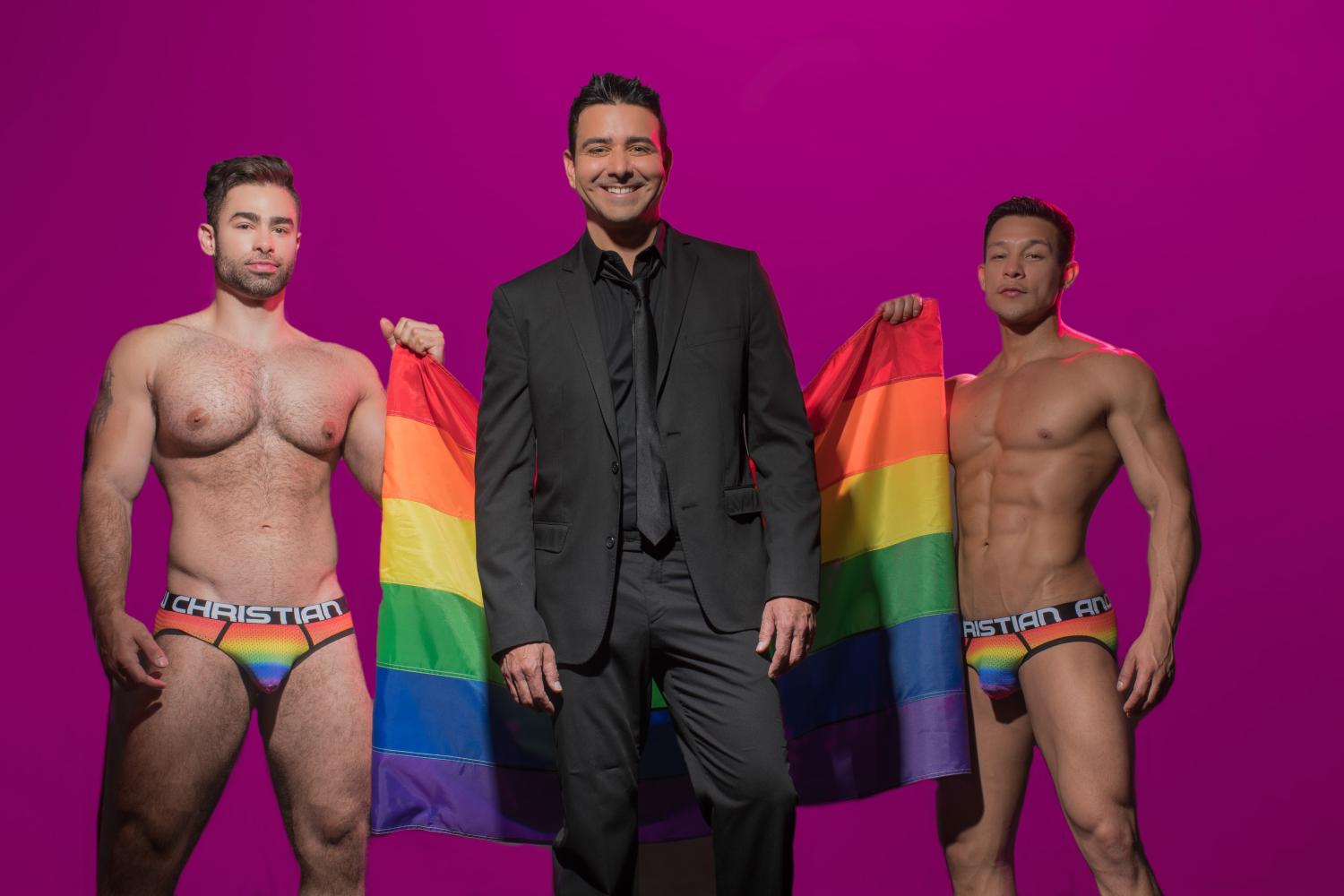
Andrew Christian – the man, the myth, the underwear legend. Over the past 25 years, Christian’s made briefs tighter, bodies tauter , and gay visibility a little more… stimulating. From a little ol’ garage in Los Angeles to an international brand that rewrote the definition of sexy, Christian’s man-panties weren’t just gay lingerie but a full-blown statement on what it means to be young, hot, and gay. And now, after more than two decades of shaking up drawers from sea to shining sea, he’s ready to close up shop on his eponymous line. Let’s talk about why, and what comes next for a designer who’s never been afraid to bare it all, literally and literally.
After more than 25 years in business, you recently made the unexpected announcement that you will be closing the Andrew Christian brand. Can you share with us what ultimately brought you to this weighty decision?
After more than two decades, I realized I had told the story I needed to tell through fashion. The brand was born from my own struggles and identity — it was my way of finding power and visibility as a gay man when the world didn’t always make space for that. But as I grew, so did my perspective. I felt it was time to close this chapter with intention and gratitude, rather than wait for the fire to fade. Creativity doesn’t retire — it just finds new ways to express itself.
Looking back to your early days in Fresno and then moving to Los Angeles, what was your initial inspiration to create an underwear line?
Honestly, it came from necessity and curiosity. I was broke, living in a converted garage in L.A., and I wanted to make clothes that made me feel confident — things I couldn’t find anywhere else. Underwear became this powerful little canvas for self-expression. It was about turning something hidden into a statement.
How did being a young gay designer at that time influence and impact your vision and voice as a creator?
It shaped everything. Being gay in the late ’90s and early 2000s meant fighting to be seen — so I made visibility my mission. My designs were unapologetic, bold, and playful because that’s what I wanted to feel in my own skin. I wanted every gay man who wore my underwear to feel seen, sexy, and celebrated.
What were some of the biggest hurdles you had to jump while building a gay-geared brand in an industry that usually takes the more mainstream route?
The biggest challenge was being taken seriously. Early on, major stores wouldn’t carry a gay brand, especially one with such provocative imagery. But that also gave me freedom — I didn’t have to play by their rules. I could speak directly to my community, which was way more rewarding than trying to fit into the mainstream mold.
Producing ethically can be tough in an industry that often rewards cutting corners. How did you stay true to your values around fair production and quality while growing the Andrew Christian brand?
I’ve always believed that every garment carries meaning. Cutting corners was never an option. We prioritized fair production, quality materials, and ethical labor practices—even when it was harder or more expensive. Beyond that, I wanted every piece to have an amazing fit, so I spent countless hours making sure each garment fit as perfectly as possible. Every piece had to honor both the wearer and the people who made it.
Looking back, do you have a favorite collection or specific piece that, to this day, feels like the essence of Andrew Christian?
I’d have to say my final collection, Bespoke. It’s deeply personal — inspired by the clothes I actually wear. They’re timeless, classic pieces with subtle details that make them special. Bespoke feels like my love letter to everyone who’s supported me — one last chance to wrap them in the love they’ve given me all these years.
What advice would you give to a young gay designer who wants to build something authentic yet sustainable in today’s oh-so-very competitive world?
Start with truth. Don’t chase trends or algorithms — chase what you need to say. Authenticity will outlast everything else. And be patient — the fashion world moves fast, but real creativity takes time. Protect your vision, and never forget who you’re creating for.
How have social media and influencer culture affected fashion brands?
It’s been a double-edged sword. Social media gave independent brands like mine a voice when traditional media ignored us. But it also created a culture of constant comparison and short attention spans. The trick is to use it as a tool, not a measure of worth.
Your imagery helped define a generation’s idea of what “sexy” looked like in gay culture. Do you ever think about how the Andrew Christian aesthetic influenced and impacted perceptions of desirability in the queer community?
All the time. It’s something I take seriously. My imagery was meant to celebrate confidence, not conformity — to say, “This is who we are, and we’re proud of it.” Over the years, I’ve seen how beauty standards have evolved, and I hope my work played some part in opening that conversation.
When people look back at the Andrew Christian brand, what do you hope they remember most?
That it made them feel something — seen, sexy, confident, part of something bigger. I want people to remember the joy, the audacity, and the freedom of expression the brand represented.
What’s next for you personally and creatively after closing this chapter? Are there any new projects you are interested in exploring?
I’m giving myself the space to breathe and explore without a deadline attached. I’m drawn to storytelling — maybe film, maybe writing — and I want to keep creating in ways that feel personal and meaningful. I don’t know exactly what it will look like yet, but I’m excited to find out.
What do you think the future of queer fashion looks like in the next… let’s say 5 to 10 years?
Honestly, I’m a little concerned. I don’t think queer fashion will thrive the way it once did. Just like gay bars are slowly fading out, I see our visibility retreating in some ways. The decade of the “gay” is over, and unfortunately, our community seems to be retreating back into the closet, so to speak. That doesn’t mean the spirit of queer expression will disappear—but the platforms and spaces where it once thrived are definitely shrinking.
I’d like to close with the most important question of all — what underwear are you wearing right now?
(Laughs) Bespoke, of course. Gotta go out in style.
Features
From the GOP to West Hollywood: How one young political advocate found his voice
Joshua Marin-Mora champions LGBTQ+ rights. For years, he worked in spaces that shunned them.
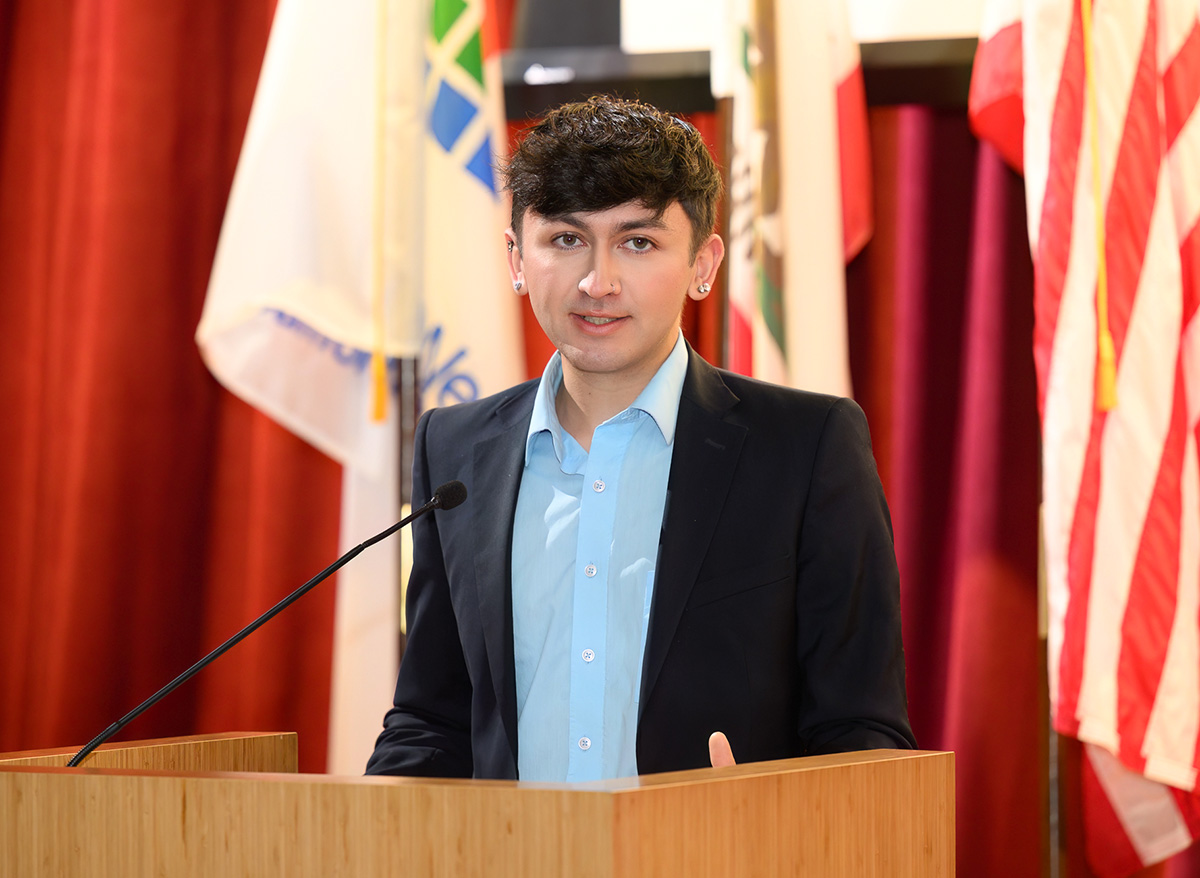
El Que dirán. What would they say?
These words emanated through Joshua Marin-Mora’s mind as a child, serving as a backdrop for a personal shame that would steep in his body and mind for years. At 14, he was the golden child: he soared academically. He shone on stage in theatre productions. He attended church with his parents, who had instilled in him a deep sense of faith.
Internally, he was struggling. He had discovered at this point that he was attracted to men. “I didn’t really know what that meant, but I knew it was bad…It was crushing. I found myself in an extremely dark and scary place. Honestly, I did not know if I would make it out of it,” Marin-Mora told the Blade.
Bright and eager, he felt his successes shadowed by this self-knowledge: this part of himself he couldn’t share with anyone else. “The Church tells me I’m supposed to marry a woman and have children. My family wants grandkids,” said Marin-Mora. “It was an inconvenience for me. It was an inconvenience for the people around me. I wanted it gone…I really thought that I could be over with it, and I really thought that God would take it away. I prayed about this.”
At 15, he discovered a new sense of purpose: one that allowed him to throw himself into public service that felt meaningful and nourishing — and one that allowed him to continue to hide his queer identity. He attended his first city council meeting in Reno, his childhood home, and witnessed for the first time conversations between residents and local legislators. He experienced people bringing their grievances to the table and saw the ways that city council members tried to form solutions.
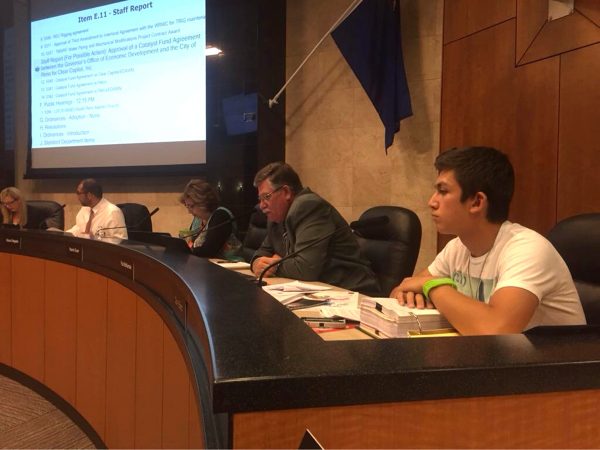
Soon after, he was elected to the youth city council, where he actively took part in community events like food, clothing, and supply drives while learning the ins and outs of local government. “I was on cloud nine,” Marin-Mora said. He actively served in the council throughout high school, and by the time it came for college, a path presented itself: one that would have him wading deeply into conservative political spaces for years to come.
“I’d basically been put into the GOP lane…it made sense for me at the time. I didn’t want people thinking I was gay. ‘Let me go for the anti-gay party’,” Marin-Mora explained. “The loud parts of conservatism in the Catholic Church seemed to fit just right with what that political party was doing.”
While studying international politics at Georgetown University, he continued to develop a deep love for politics and figuring out how “the system” worked. In his junior year, the COVID-19 pandemic began, and, like many other LGBTQ+ folks during the following period of isolation, he was beginning to engage more with queer media as he contended with the shame he had grown to hold around being gay.
In this conversation with the Blade, Marin-Mora discussed the breaking point that led to his coming out, the viral online backlash he faced for being out in politics, and his journey of queer self-acceptance and transformation that led him to sell all his things, move to California, and abandon his previous work to fight for queer liberty.
When was the first time you opened up to someone about being gay, and what led up to that moment?
It was the second half of my junior year [in college]. I go home, and I’m watching the show Love, Victor. The lead was a gay Latino kid who had to navigate what it meant to be that. I still haven’t ever related so much to a story on television. I saw me, and the floodgates just broke open. My whole life flashed before my eyes because I actually gave myself permission to even entertain the idea, which was radical at the time for me.
I thought about the priest who discouraged me from going to Pride. I thought about El Que dirán. What would the family say? I [had] been doing all this professional work for the GOP. Could this derail that? But at the end of it, I was just so touched. I went to my best friends. We went to the National Mall. And I remember thinking, “Look, you have to buckle up.” Because the way I saw it: once you say it, there is no going back.
I never felt such a weight off my shoulders, and I underestimated how ready I actually was to do this. Within the next couple of days, I’m getting my ears pierced. I’m dyeing my hair. I was on top of the world, and nothing else mattered to me. I had my support system. They cared [for] and loved me — my chosen family. And that was what mattered. You know what I believed? Maybe this could work. Maybe I can carve out a place for me…But life got real, and then there came the point when it was time to wake up.
What do you mean by that?
I worked on a very high-profile campaign [for Virginia governor Glenn Youngkin] right out of college. And while I was on the campaign, I went to my first Pride. It was so amazing. I went with my support system. But I was at a campaign stop in rural Virginia, and my phone blew up.
I had posted a photo of myself at Pride in a skirt. It felt like the right thing for me to do at the time. I loved it. I have no regrets, but there were a lot of people who didn’t like that. It became this entire thing. I was reading the nastiest comments online. My photo is getting blasted everywhere, and my blood went cold because I was afraid. I don’t know how big this was going to get. And this is a high-profile campaign — this was one of two special elections in the entire country that the whole nation is watching.
After the shock had settled down, I remember feeling angry. I was mad at myself, and I was mad because I wasn’t surprised. By this point, the GOP had already started this ugly culture war that had taken place that was gaining traction around the country. They were smearing trans people. They were enacting policies to out LGBTQ+ students. They were cracking down on schools and banning books. I’m ashamed to admit that I looked away and that it took me getting burned to realize sort of the extent of truly what was happening. I had to grapple with myself.
I thought there could still be a place [for me]. Now I’m wondering: Is politics even for me? Can I even handle this anymore? I moved to Colorado…I couldn’t even imagine starting from zero, every connection I’d made, all the experiences that I gained, to just start over. It was nerve-wracking. So I worked on moderate campaigns, and I ended up finding that the culture war wasn’t going away. Mass shootings were still happening. This is 2022, by the way. Roe v. Wade was overturned. Only Democrats were talking about health care reform and actually doing something about it.
My role was to listen to the other side on these campaigns, and…I realized that my views, my values — they were just pulling me in a whole different direction. So now I’m experiencing an identity crisis, the voice that I thought I had found…I didn’t know where that was anymore.
In 2023, I’m living in Denver, and by a miracle, I worked for my first Democratic campaign. It didn’t last long, but it felt better. It felt right. But by that point in my life…I really didn’t think that I’d done enough. I [kept] looking at everything happening nationwide. I’m not the kid getting outed. I’m not the trans person whose dignity is being stripped away. It’s all ramping up even further, and I had played some role in all. I felt terrible. I felt awful. I didn’t know who I was. And so I realized, I couldn’t stay in Colorado. I was desperate for a fresh start.
So [in the] summer [of] 2023, I sold what I could. I had no job lined up because the other campaign had just ended, and I came and I moved to LA.
How did you make it work?
I was directing traffic at SoFi stadium. I was helping out with check-in and giving out bobble heads at Dodger Stadium. I was like, I’m gonna make it work. This is the dream. Then, a couple of months later, I saw that my assemblymember was hiring, and Rick Chavez Zbur literally gave me the shot of a lifetime, and it changed everything.
How has this experience working with Assemblymember Zbur been pivotal for you?
Being gay had been the source of so much pain for me up until this point, and I was able to flip that whole thing on its head…Growing up, I was very cognizant of the tightrope that I was on. I knew in my truest, deepest self, that if I veered too much off the tightrope, I had to do everything to correct.
I am [now] working for a gay elected official who is unabashedly a champion for progressive points. I am working out of one of the gay meccas in the world, West Hollywood. I didn’t feel like I was on that tightrope anymore. I had actually found my voice. In addition to that, going to this idea of penance, now I get to be on the front lines and fight for all those people that had been further marginalized.
I was thinking about this little kid in me that had it really hard. [He’s] a community leader who had been on the front lines. He lived through the AIDS crisis. He led Equality California. He saw that I was trying to come home. He gave me that chance, and I will always be grateful for that.
I go home, I go to sleep at night proud of what I’d done that day. I’m back in the community, just like I’d always wanted to be. I’m helping people. I’m trying to make their lives even a little bit better, just like that lifeline that has really driven me throughout my entire life.
Can you tell me more about your belief in the political system? How do you empower yourself and others to keep going, especially when faith in that system can be really difficult for queer people and other marginalized communities?
Decisions are being made every day that will impact our livelihoods and will impact our futures. And if we don’t get involved, if we don’t fight — if you’re not at the table, you’re on the menu. I personally feel like there is so much at stake that it takes all of us. We’re all on the same ship, one way or another, and that’s why I believe in the system.
Losing faith in the system is exactly what they want. They don’t want us involved. They don’t want us making noise. They want to run the whole thing. When you realize that, when you wake up to that, when you think about your neighbors, when you think about your communities, I’ve experienced how easy it is to look away or not care until you’re at the end of the brunt. It changes your whole worldview.
No system is perfect. I remember that city council meeting that I went to: all those neighbors who were coming up to speak and ask for change. They were the ones the decision makers were listening to. And if the decision makers aren’t making the right changes, then you try to become the decision maker. It’s very easy to get overwhelmed and over consumed, but I think about the bigger picture. What can I do? What part can I play?
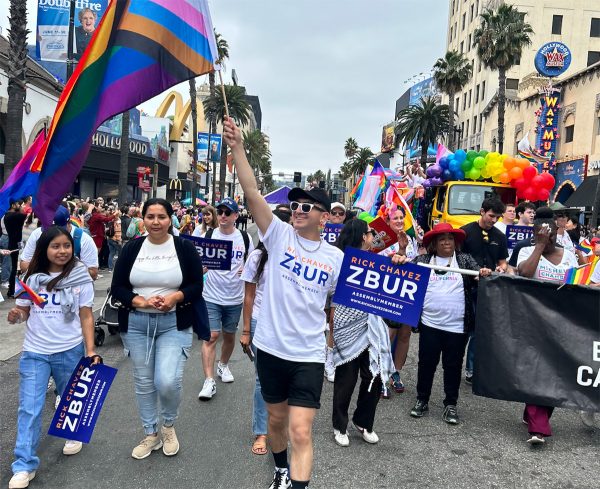
Follow Joshua on IG: @Joshua_MarinMora
-

 Sports5 days ago
Sports5 days agoOut Athlete Fund is supporting 6 queer athletes on their way to the 2026 Winter Olympics
-
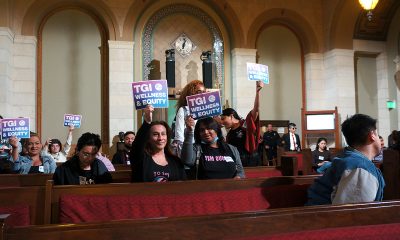
 Los Angeles5 days ago
Los Angeles5 days agoCommunity members urge city council to invest in trans lives
-

 a&e features5 days ago
a&e features5 days agoAlexander Skarsgård describes ‘Pillion’ in 3 words: lube, sweat, leather
-
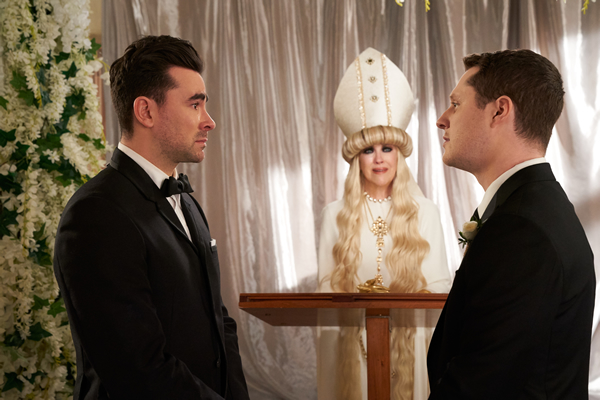
 Obituary4 days ago
Obituary4 days agoCatherine O’Hara, ‘Schitt’s Creek’ star and celebrated queer ally, dies at 71
-

 Television2 days ago
Television2 days agoSay ‘Hello, Hello, Hello’ to ‘Drag Race’ winner Onya Nurve
-
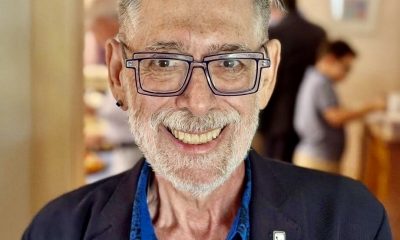
 Features3 days ago
Features3 days agoLGBTQ+ legal hero Jon Davidson hands civil rights torch to new generation
-

 Film3 days ago
Film3 days agoRevolutionary lesbian film “Rafiki” secures victory in fight against censorship in Kenya
-

 Commentary2 days ago
Commentary2 days agoAre we addicted to yearning?
